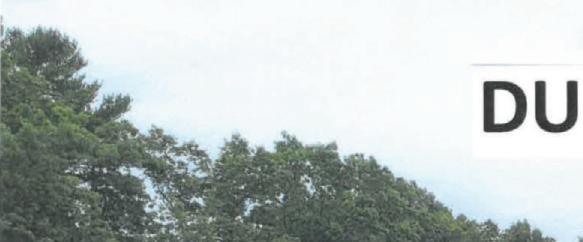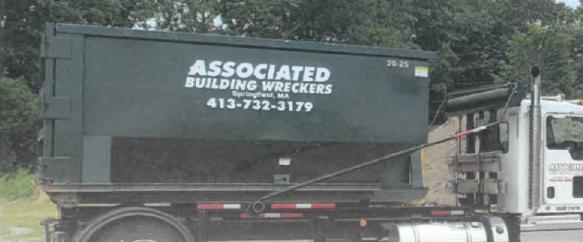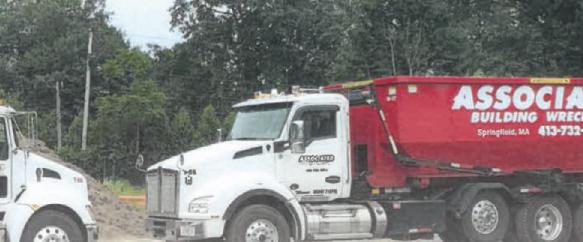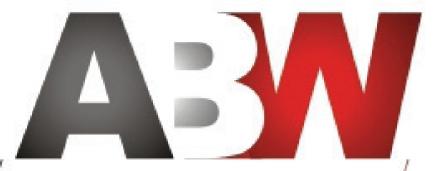






The Springfield Materials Recycling Facility (MRF) Advisory Board is pleased to share this issue of the Reduce, Reuse, Recycle guide as we celebrate this 53rd anniversary of Earth Day. It is full of useful information. I encourage you to keep a copy handy so you can refer to it all year long.
This guide marks the 15th year of a collaborative effort between The Republican and the Springfield Materials Recycling Facility (MRF) Advisory Board, with support from local advertisers. It is being produced as part of our Earth Day 2023 Celebration.

MRF Advisory Board members, Jan Ameen (Franklin County Solid Waste Management District), Linda Cernik (Hilltown Resource Management Cooperative), Tracy DeMaio (Hampden County), Amy Donovan (Franklin County Solid Waste Management District), Abbey Massaro (Hampden County), Arlene Miller (Hampden County), Michael Pattavina (Franklin County), Laurie Simmons (Hampshire County), Mary Strucklen (Berkshire County), Susan Waite (Mass DEP) and Rene Wood (Berkshire County) wrote or contributed to the text.
In addition Brooke Nash of Mass DEP and Cristina Ferrera (City of Springfield) contributed to the text.
Arlene Miller, Chair of the Advisory Board says, “It is our hope that both residents and businesses find the Reduce, Reuse, Recycle Guide a valuable tool in managing wanted and unwanted materials. We especially appreciate the advertisers who make this publication possible. Please support our advertisers and tell them you saw their ad in this Recycle Guide! “
The solid waste industry continues to change rapidly in 2023. Commodity market values cycle up and down while trash disposal cost continue to rise as more trash is transported out of state. At the same time, recycling facilities (MRFs) are investing heavily in new technology increasing their sorting efficiency. Superimpose on these advances media messaging, with such statements as “recycling is garbage.” No wonder people are confused. This Reduce, Reuse, Recycle Guide focuses on providing up to date information, which will help inform the readers about the “real story of recycling in western Massachusetts”. You will find helpful information about battery recycling and disposal, school compost programs, the real story of plastics recycling as well as our comprehensive “What to Do with” guide (the A-Z of recycling).
Motivated by all these changes and the need for clearer and better information about recycling, the Springfield MRF Advisory Board has focused much of its time and resources these past 18 months on creating broad and diverse recycling education materials. Two projects are worth mentioning.
The first project consisted of updating, printing and distributing a variety of educational material in the form of postcards, pamphlets, magnets, decals, and signs. About 13,500 pieces of educational materials were distributed to towns all over western MA. This material provides clear and direct information about the yes and no of recycling in western MA.
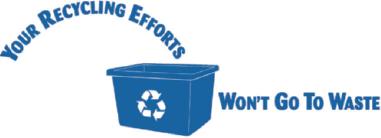
The second and most ambitious project was our video project. The Springfield MRF Advisory Board produced five videos; (Me and My Bin) and four short videos about household recycling to help viewers understand what happens to the materials they recycle. The videos are an antidote to misinterpretations recently shared by media outlets.
The short videos focus on four different topics: Container Recycling, Paper and Cardboard Recycling, What Happens to Recycled Materials, and Recycling’s Most Unwanted. The videos include interviews with recycling industry experts, footage of recyclables being sorted and baled, and information on the industries that purchase local recyclables for reuse. This new series, along with the already popular Me and My Bin, gives western Mass residents a behind-the-scenes look at the environmental and economic values of recycling. The new videos are available at springfieldmrf.org and on YouTube (www.youtube.com/@ springfieldmrf4175). The four videos are currently being translated into Spanish, Russian, Turkish and Ukrainian. The series sends a clear and simple message: Recycling is important, and we each have a role to play.
We are pleased to celebrate this 15th edition of the Reduce, Reuse, Recycle Guide in partnership with The Republican, and send special thanks to the Western Massachusetts business owners that make production of this useful resource possible through their advertising support.
Sincerely,
Arlene C. Miller Arlene C. Miller Chair, MRF Advisory Board PROGRAMFamily owned and operated since 1974, we have always cared about the communities we ser ve because we live, work , and play here just like you. Inspired by future generations, we continue to adapt and innovate—embracing new technologies to meet the ever-evolving recycling landscape

Our innovations include building the largest state - of-the - ar t recycling facilit y in the countr y, powering our buildings with solar energy, and fueling our trucks with all- American natural gas
We’re committed to our communitiies and the planet.

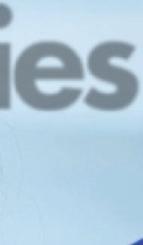


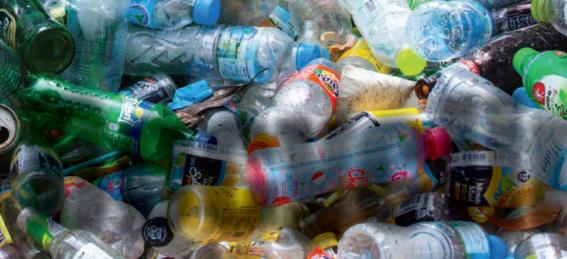
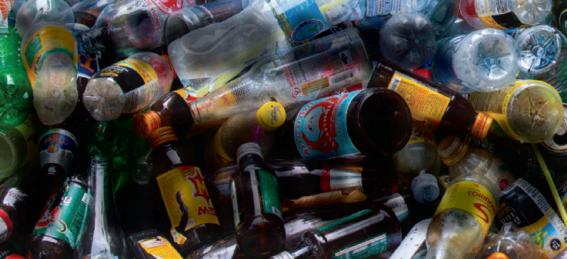
 By B rooke Nash Branch Chief – Municipal Waste Reduction, Mass Dept of Environmental Protection
By B rooke Nash Branch Chief – Municipal Waste Reduction, Mass Dept of Environmental Protection
You’ve probably seen the headlines or heard a story on the news. Plastic recycling is a “dead end” or even worse, a “dumpster fire”. That only 5% of plastic gets recycled. You may be wondering if you’re wasting your time, as these stories suggest, by sorting out your yogurt tubs, peanut butter jars and detergent bottles. We’re here to set the record straight. Plastics recycling is alive and well in Massachusetts. News stories that say otherwise aren’t telling the whole story and they don’t reflect the reality of recycling in the Bay State.
Where Recycling Happens
in Massachusetts
Massachusetts is home to nine Materials Recovery Facilities (MRFS) where more than 638,000 tons of plastic containers, paper, bottles and cans go for sorting every year. (See map below for locations or check out “Where Does It Go” to see where your municipality’s recyclables go).
At a MRF (pronounced “murph”), mixed recyclables travel through a sophisticated maze of manual and mechanical sorting process. Once the paper, cardboard, metals, and plastic are separated from glass, they’re compressed into 1,000-pound bales and sold to companies to be made into new products and packaging. Watch this Instagram story for a tour of the process. Or better yet, schedule a tour of the Springfield MRF to see for yourself!
Massachusetts’ first MRF was built in Springfield in 1991 by the Commonwealth of Massachusetts. Recently retrofitted to improve its sorting
efficiency, the Springfield MRF (SMRF) uses near-infrared (NIR) technology to identify different plastic resin types and then sorts those resin types into distinct bales. In fiscal year 2022, the SMRF sent 1,752 tons of plastic bottles, jars, jugs and tubs to plastics recyclers, including Unifi and KW Plastics. Plastics recyclers pay MRFs for the sorted, baled plastic which they in turn wash, grind, and extrude into pellets called “post-consumer resin” (PCR). PCR is then sold to manufacturers that produce packaging, housewares, textiles, automotive, and agricultural products.
Massachusetts regulations, called waste bans, prohibit the disposal of glass, plastic, and metal containers and paper in landfills and incinerators. In other words, it’s against the law for recyclables to be dumped in the trash. The Massachusetts Department of Environmental Protection (MassDEP) regulates the activities of MRFs, which are required to report annually, under penalty of perjury, the tons of material they recycled and upon request, where it was sent for recycling. When MassDEP inspectors visit MRFs, they look at the outbound commodities (paper, plastics, metal, glass) and they inspect the “residue” to ensure that it consists of things that are not recyclable. Setting the waste bans aside, ask yourself why a MRF would choose to send recyclable plastic to a landfill or incinerator at an average cost of $100 per ton, instead of selling it for anywhere from $180/ton (polypropylene tubs and lids) to $1,500 ton (milk and water jugs) in today’s markets. More than
90% of that plastic is reclaimed by North American recyclers according to the latest data for 2020.
What’s residue?
The residue pile at a MRF is the stuff that’s sorted out of the recycling because it doesn’t belong there in the first place. In the residue pile you’ll find things like plastic bags, garden hoses, small appliances, wire hangers, electronics, shoes, diapers and more. If you’ve recycled an item that you weren’t sure about, but figured it couldn’t hurt, then you’re guilty of “wish cycling”. While it may seem harmless, the wrong items in the recycling bin add cost to the sorting process, damage equipment at the MRF, and pose risks to workers.
So where does the claim that “only 5% of plastics are being recycled” come from? It’s a math thing. If all the plastic products produced in the U.S. – from car bumpers, medical devices and vinyl siding to appliances, playground equipment and polyester carpet (see image below) are lumped together and compared to the plastic containers and packaging collected from municipal and commercial recycling programs, you get a recycling rate of 5% (Greenpeace) or 8.5% (EPA).
This number is misleading because it gives the impression that all that durable stuff is designed and intended to be recycled. It isn’t. The only plastics that are recyclable in our residential and commercial recycling programs are rigid plastic containers and packag-
ing. New stories suggest that the plastic containers accepted by our local recycling programs are tossed in the trash. Quite the opposite, when we recycle the containers identified in the Smart Recycling Guide, we’re part of a reverse supply chain that converts these materials into marketable commodities that become manufacturing feedstock for new products. And that’s something to celebrate.
We agree that our world has too much plastic in it. We need to produce and use less, especially the kind we can’t recycle and for which there are better alternatives (like Styrofoam). We agree that a lot of perfectly good plastic bottles, jars, jugs and tubs end up in the household trash bin because not everyone with access to a recycling program participates in it. Then there are the more than 40 million U.S. households that don’t have a recycling option at all. We agree that recycling rates need to improve. And we hope that negative recycling reports don’t result in even less recycling. We agree that recycling is not a panacea for our waste problem, but it IS a valuable tool in the toolkit and should not be dismissed or disparaged. We agree that everything that CAN be recycled SHOULD be recycled.
It’s time to redouble our recycling efforts and to tell our friends, neighbors, coworkers and family that recycling matters. The plastics recycling industry not only wants our plastic containers and has the capacity to recycle them, but experts say a shortage of recycled plastics will prevent
major consumer brands from meeting their sustainable packaging goals and complying with new laws that require recycled plastic be used to manufacture specific items. At the same time, we need to support efforts to design packaging for recycling. Because there are still lots of plastic packages on our grocery store shelves that aren’t recyclable. And that’s got to change. The most powerful thing you can do is speak out. Email the company whose product you love, but whose package you can’t recycle and ask them to change it. Now more than ever, consumer brands are listening to their customers’ demands for sustainable products and packaging.
And Finally, Remember to Recycle Smart!
Don’t let the headlines fool you. Recycling is a vital part of our state’s economy. It also saves resources, energy and reduces greenhouse gas emissions.
Use Recycle Smart MA’s statewide Smart Recycling Guide and the Recyclopedia to make sure you’re putting the right stuff in your recycling bin or check the Springfield MRF’s website.
Recycle Smart MA is an initiative of the Massachusetts Department of Environmental Protection. Follow RecycleSmartMA on Facebook, Instagram and Twitter and sign up for the newsletter for practical and insightful tips on how to reduce, reuse, repair, share, recycle and compost for a cleaner planet.
Brooke Nash is the Branch Chief for Municipal Waste Reduction at the Massachusetts Department of Environmental Protection
locations.
The regional materials recycling facility (MRF) in Springfield sorts, bales, and sells recyclable paper and containers from over 73 Western Massachusetts communities. Owned by the State of Massachusetts and operated with guidance from the Department of Environmental Protection and a local advisory board, the Springfield MRF has processed over one million tons of Pioneer Valley recyclables since it opened in1989.
Please recycle these items:


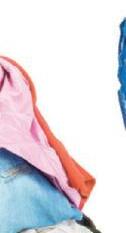
* PLEASE KEEP THESE ITEMS OUT OF THE HOUSEHOLD RECYCLING. At the recycling facility, plastic bags, hoses and holiday lights cause safety hazards and shutdowns when they wrap around conveyor belts and equipment. Plastic bags, holiday lights and textiles can be recycled and/or donated in other locations. This NO list is not all-inclusive.

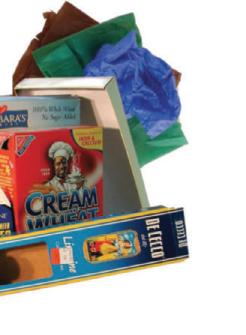
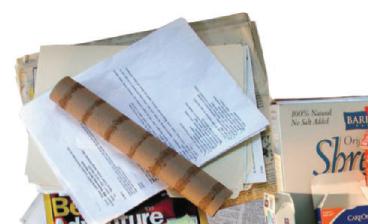

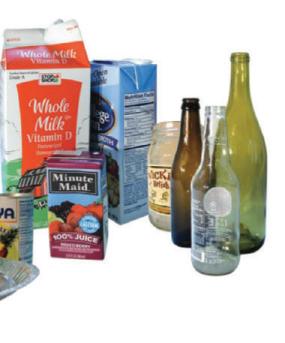
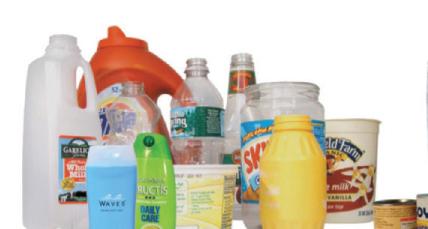
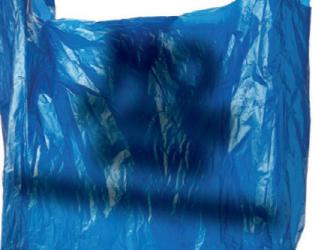

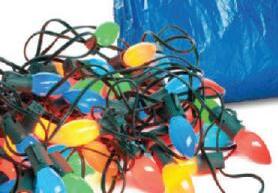

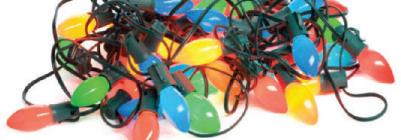

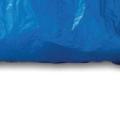
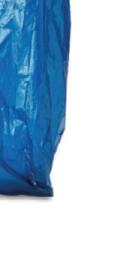
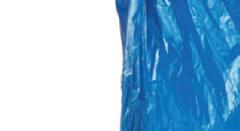

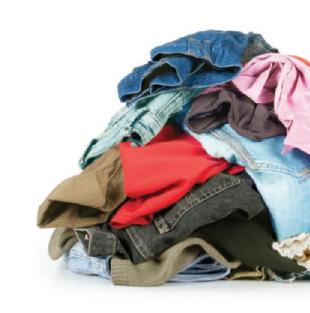
This A-Z disposal guide was designed to provide reuse, recycling or disposal options for items that are not accepted in municipal recycling, or to provide more information for some of the accepted items. For information on what to put in recycle bins, and what to leave out, see the “Recycle in Western Mass” graphic at springfieldmrf.org/docs/ postcard-mar23.pdf
= Items that are hazardous or require special handling.
Empty aerosol cans belong in the trash, unless they contain hazardous material (e.g. paint, insecticide), in which case they are household hazardous waste. A handful of transfer stations/recycling centers accept completely empty, non-hazardous aerosol cans in scrap metal dumpsters (empty cans are completely silent when the button is pushed).
See the Community Recycling Information table in this guide for local disposal information. More info: mass.gov/info-details/safely-manage-hazardous-household-products.
Rinse clean & recycle with bottles & cans. Acceptable items include aluminum pie pans and take-out containers, disposable roasting pans, and clean aluminum foil (ball it up). The “foil” lids from yogurt containers should not be included, as they contain a layer of plastic that causes issues when the aluminum is melted down.
ALUMINUM SIDING
(see “Scrap Metal”)
Call your Police Department for proper disposal instructions.
ANTIFREEZE
(see “Automotive Products”)
APPLIANCES (see “Scrap Metal”)
ARTS, CRAFTS & HOBBY ITEMS
Some paints, solvents and related materials are considered hazardous and should be brought to a hazardous waste collection. Always check the label before tossing in the trash. Crazycrayons.com offers a crayon recycling program and terracycle.com offers mail-in programs for many art supplies, markers, and pens.
ASBESTOS
There are strict removal & disposal requirements for asbestos. Contact the Western Region of the Mass Department of Environmental Protection: David Slowick; david.slowick@ mass.gov, 413-348-7186. To find licensed asbestos contractors, go to mass.gov and type “Asbestos Contractors” into the search bar.
AUTOMOBILES
(see “Vehicles”)
AUTOMOTIVE PRODUCTS
Automotive products contain hazardous materials & must be handled with care. Do not dispose of in the trash, on the ground or down the drain. Empty plastic automotive product jugs belong in the trash (replace caps first). Do not recycle them. Many towns accept automotive products at transfer stations or hazardous waste collections. See the Community Recycling Information table in this guide.
• Motor oil
Even a small amount of improperly disposed of motor oil will contaminate water & soil. In Massachusetts, retailers that sell motor oil are required by law to accept up to two gallons of used oil at no charge with an original sales receipt. Many auto supply stores, auto repair shops and quick oil change chains will accept used oil
even if you didn’t buy it from them. Many towns accept motor oil at transfer stations or hazardous waste collections. For assistance, call the MassDEP Used Oil Hotline at 617-556-1022.
• Motor oil filters
Some auto supply stores (e.g. AutoZone) or auto repair shops accept oil filters for free recycling. Some municipal transfer stations accept motor oil filters. Oil filters may be thrown away or recycled in scrap metal collections only when the oil has been completely drained (while filter is still warm, puncture the dome top & drain into a collection container. Collect oil drips and dispose of properly as used motor oil; see above entry).
• Antifreeze
Antifreeze is not only hazardous; its deceiving color & sweet taste may attract children, pets & wild animals. Consider having your vehicle’s radiator flushed at a service station to avoid the responsibility associated with proper storage & disposal. Some auto supply stores accept antifreeze for free recycling. Antifreeze should be brought to a household hazardous waste collection.
• Brake fluid
Brake fluid is hazardous and must be brought to a household hazardous waste collection.
BABY FOOD POUCHES
(see “Plastic Pouches”)
BAGS
(see “Plastics”)
BALLASTS
(see “Mercury & Mercury-containing Products”)
Never put batteries of any type in a regular recycling bin. Common single-use household batteries (alkaline, carbon zinc and zinc chloride in sizes A, AA, AAA, C & D, 9 volt, lantern size) manufactured after 1996
don’t contain mercury or other hazardous/recyclable materials & can be thrown away as trash. (Before disposal or storage, put plastic packing or electrical tape on the contacts of 9-volts and lantern batteries.) Check labels carefully; some batteries that require special handling resemble alkaline batteries.
ALL other battery varieties contain hazardous materials and require special disposal. Never put these batteries in recycling or trash bins.
There are many free, convenient drop-off options for batteries, such as municipal transfer stations, Staples, Home Depot, and Lowe’s Stores. See the Community Recycling Information table in this guide or search online with your zip code at earth911. com. Some hazardous waste collections accept batteries. More options for specific batteries:
• Button batteries (found in watches, hearing aids, electronics & some toys) are accepted free of charge at watch/jewelry shops or audiologist offices.
• Lead acid batteries (found in vehicles, boats, motorcycles, kids’ ride-on toys, lawn mowers) will be accepted by the retailer from whom you buy a new one (they are required to take one back at no charge). Scrap metal recyclers typically pay for lead acid batteries. Many transfer stations accept them.
• Lithium batteries (single use battery often used for cameras) can resemble alkaline batteries, but these should be recycled properly: some municipalities accept them. Check all batteries carefully before disposal; look for “Lithium” on the label.
• Rechargeable batteries contain heavy metals and can start fires; they should never be put in trash or recycling bins. Recharge-
able batteries are found in rechargeable electronics such as cell phones, cordless phones, power tools, laptops, tablets, digital cameras, camcorders, UPS battery back-ups, rechargeable toys, baby monitors, robotic vacuum cleaners, emergency medical equipment, e-bikes, rechargeable devices such as toothbrushes, razors, flashlights and hand-held vacuum cleaners, plus batteries that can be recharged with a battery charger. Most transfer stations have special pails or boxes for rechargeable batteries, as do Home Depot, Lowes, and Staples stores. Rechargeable battery chemistries are Nickel Cadmium (Ni-Cd), Nickel Metal Hydride (NiMH), Lithium Ion (Li-ion), Nickel-Zinc (Ni-Zn), and small Sealed Lead Acid (Pb) batteries (up to 11 pounds). A label on a battery that has “mAh” or “RECYCLERBRC” in a circle indicates a rechargeable battery. For more information and options for recycling rechargeable batteries, go to call2recycle.org. Lithium batteries pose fire risk: if a lithium battery becomes swollen or damaged, handle carefully and bag separately, then place battery in a metal canister or glass jar surrounded by clay kitty litter or speedy dry. Bring to your town’s transfer station or hazardous waste site.
It may look recyclable, but beer and soda cartons or cases contain plastic or bonding chemicals so that they stay strong when wet. The plastic and chemicals contaminate recyclable paper. Please place all “paper” beer and soda packaging in the trash.
Plastic six-pack rings and fourpack “snap top” can carriers are not accepted in household recycling. Flexible plastic sixpack rings get wrapped around sorting equipment at recycling
facilities and pose a danger to wildlife. Cut up rings and put in the trash or collect and mail six-pack rings to the RingRecycleMe program (ringrecycleme. com).
“Snap top” six or four-pack can carriers are often made with 100% recycled plastic, which provides a market for recycled plastic. However, snap tops are not acceptable in recycling because their size and shape make them challenging to sort. Mass Brew Bros has established a can carrier reuse program; save your snap tops and find a drop off location near you at: massbrewbros. com/can-carrier-recycling and paktech-opi.com.
Working bicycles in good condition may be gifted to individuals via an online sharing group (e.g. a “Buy Nothing” Facebook group or Freecycle. org), or offered to charities (search online via “bicycle donation”) and other organizations that will use them. For recycling options, see “scrap metal.”
See disposal suggestions under “Vehicles.” Metal boats are accepted at scrap metal dealers, while other varieties are sometimes accepted as bulky waste at municipal transfer stations (call to inquire, see local contact info in the Community Recycling Information table in this guide). All engine-type fluids must first be drained and properly disposed of.
Books in good condition may be sold (used bookstores, tag sales), donated (public libraries, fund-raising sales, drop boxes at transfer stations), or shared (book exchanges, swap shop). “Little free libraries” have grown in popularity; find one near you at: littlefreelibrary.org/map. Reader to Reader, an Amherst-based non-profit, collects library-quality books and distributes them to U.S. schools and public libraries (readertoreader.org). Roundabout Books, a Greenfield-based bookstore accepts dry books in any condition and can recycle
unsalable hardcover books (roundaboutbookstore.com).
Paperback books & phonebooks are considered recyclable in small quantities, as are only the pages of hardback books. Rip pages out and recycle those. Covers and spines from hardcover books must be placed in the trash.
Plastic caps & lids are recyclable only when fastened to a plastic bottle/jar/jug/tub. Loose plastic tops should be placed in the trash as they can create safety hazards and shutdowns at recycling facilities. Metal screw-top lids from glass jars (e.g. pasta sauce, pickle jar) should be attached to the container. Loose metal food can lids are acceptable, but it is best to push them inside the can prior to recycling.
• Clean cardboard, boxboard, and paperboard boxes are recyclable (e.g., boxes from cereal, crackers, tissues, shoes, gifts, etc.) Attached plastic windows may stay, but discard all plastic liners. Flatten.
• Pizza Boxes are recyclable, as long as they are empty. A 2020 study found that greasy pizza boxes do NOT cause problems for recycled paper manufacturers. It is now OK to put the entire empty pizza box into recycling (remove all crusts, food, foil, plastic, or waxed paper). Link to the study: tinyurl.com/pizzaboxes2020
• Frozen food boxes, ice cream cartons, case boxes from soda or beer, and kitty litter boxes should be placed in the trash as they are not acceptable in recycling or composting. These boxes are made with “wet strength paper,” which contains plastic or bonding chemicals that help the boxes to stay strong when wet. The plastic and chemicals contaminate recyclable paper.
Construction & demolition (“C&D”) waste includes asphalt, asphalt shingles, bricks, cement, cinder blocks, clapboard, concrete, doors, flooring, insulation, lumber, mortar, plaster, plywood, roofing, sheetrock, tiles, windows & wood. Fee-based disposal options are available at many recycling/transfer stations; for more information, call the phone number listed for your town in the Community Recycling Information table in this guide. Vehicles with a capacity greater than 5 cubic yards are subject to strict disposal requirements for C&D wastes in MA. For more information: mass.gov/lists/ managing-construction-demolition-cd-wastes.
Used building materials in good condition can be donated to a reuse store such as Eco Building Bargains. Call prior to delivery to confirm that your materials will be accepted, or to arrange for free pickup. Items might be tax-deductible.
• EcoBuilding Bargains, 83 Warwick St., Springfield, MA (413-788-6900; ecobuildingbargains.org)
Wooden pallets can be reused or recycled as “clean wood waste.” Disposal options for
large quantities include (but are not limited to) Martin’s Farm (Greenfield: 413-7745631), 360 Recycling (Westfield: 413-562-0193).
Note: pressure-treated wood should only be disposed of in a landfill. Do not put it in a backyard compost pile, a brush or chipping pile; do not burn it or send it to a waste incinerator for disposal. For bulky waste disposal at local transfer stations, see the Community Recycling Information table in this guide.
Staples stores, Best Buy stores, and many electronic waste (e-waste) recycling programs accept digital cameras for free recycling.
Canning jars (e.g. mason jars) are not recyclable because of the thick, heat resistant glass. Reuse, give to a friend who can use them, put in a tag sale or swap shop at a transfer station, or place in the trash.
Flor® offers a free mail-back recycling program for carpet squares (flor.com/recycle). Some nonprofit organizations accept relatively clean carpet for reuse. For local disposal in-
formation, see the Community Recycling Information table in this guide.
This category includes “gable top” refrigerated cartons used for milk and orange juice, plus shelf-stable “aseptic packaging” for almond milk, soup, and juice boxes. Cartons are acceptable in single stream recycling programs in western Mass. In dual stream recycling programs, cartons should be recycled along with bottles, cans, and containers. Rinse cartons, discard straws; plastic caps & spouts may remain on carton. Do not flatten.
Ice cream cartons are not accepted in recycling. Don’t include foil drink pouches (e.g., Capri Sun, Honest Kids) in municipal recycling. See “Plastic Pouches” in this guide for recycling options.
CARTRIDGES (see “Ink, Printer & Toner Cartridges”)
Cell phones should not be put in the trash due to their reuse value & hazardous/recyclable components. Never put cell phones in recycling
CONTINUED FROM PAGE S7
bins. Numerous charitable & for-profit organizations accept cell phone donations. Search online using “cell phone donation.” Stores that sell cell phones also accept them for free recycling, and many cell phone manufacturers offer buy-back programs through the mail. Many municipal transfer stations also accept them for special recycling programs, as do Lowes and Staples stores. For locations, search with your zip code at call2recycle.org/locator or earth911.com.
Terracycle’s Free Cigarette Waste Recycling Program (terracycle.com/en-US/brigades/ cigarette-waste-recycling) accepts extinguished cigarettes, filters, loose tobacco pouches, outer plastic and inner foil packaging for recycling into plastic lumber and other products.
“Plastics”)
(see “Household Hazardous Waste”)
As of November 1st 2022, textiles are banned from the trash in Massachusetts. There are many local reuse & donation opportunities for all textiles & shoes. Deliver CLEAN & DRY textiles & clothing to drop-off boxes serviced by organizations such as the Salvation Army (easternusa.salvationarmy.org) and Bay State Textiles (baystatetextiles.com/ locations) & donation centers such as Goodwill Industries (goodwill.org). Many municipal transfer stations host textile drop boxes. DO include items that are torn, stained, with missing buttons or broken zippers, as these organizations sell damaged textiles to recyclers to be made into wiping cloths and insulation. Acceptable items include
these CLEAN & DRY items: mismatched socks, shoes and gloves; all clothing and accessories including belts, ties, underwear & purses; and linens such as curtains, toss pillows, light comforters, sheets, towels, and stuffed animals in any condition. Some animal shelters also accept old sheets, blankets, pillowcases, bedspreads, throw rugs & towels for reuse (call first).
To find local clothing consignment stores or quality used clothing, go to thethriftshopper.com. See also thredup.com, swap.com, poshmark.com, and wornwear.patagonia.com.
Bras can be donated to Salvation Army or Goodwill; any items that are not in good condition will be baled and sold for textile recycling. New & gently used bras can be mailed to The Bra Recyclers for distribution to women in transition around the world: brarecycling. com; 480-988-2283.
Some non-profit organizations target specific types of clothing to benefit those in need, such as professional clothing and wedding dresses (westernmass.dressforsuccess.org; donatemyweddingdress.org).
Do not put hangers of any type in recycling bins: hangers get caught in machinery at recycling facilities. Metal hangers are accepted for reuse by some dry cleaners & are also accepted in scrap metal recycling dumpsters at most recycling/transfer stations. Unfortunately, plastic hangers are not recyclable and should be put in trash when they are no longer useable. Hangers are reusable; offer via an online sharing group (e.g. Freecycle. org, “Buy Nothing” Facebook group). Some charitable organizations accept hangers for reuse or resale.
(“see Mercury & Mercury-containing Products”)
COMPUTERS & TV’S
(see “Electronics”)
(see “Building & Remodeling Materials”)
Never pour cooking oil down the drain. Liquids should be kept out of trash, recycling, and municipal compost bins. Lifecycle Renewables accepts vegetable oil by appointment from individuals. It also provides containers and pays for the oil at food service providers: 888-461-9831, lifecyclerenewables.com. Lifecycle Renewables’ used cooking oil is transformed into replacements for fossil fuels. Western Mass Rendering provides dumpsters for large collections: westernmassrendering.com; 413-5696265.
CORKS
Corks should never be put in recycling bins, carts, or dumpsters; remove corks from bottles before recycling. Natural corks can be composted via municipal/commercial composting programs or chopped up & added to a backyard compost bin. ReCORK recycles natural wine & champagne corks (no plastic corks); multiple local drop off sites are listed at recork.org. River Valley Co-op stores in Northampton and Easthampton host “Cork ReHarvest” drop boxes for natural corks (no plastic). There are no local recycling options for plastic corks. Terracycle offers a feebased recycling program for corks of any type: terracycle. com. Reuse is an option; wine corks can be reused in many creative ways (search online for “cork art”).
Not recyclable in municipal recycling programs. Mail-in recycling programs for empty cosmetics containers can be found at terracycle.com and maccosmetics.com/giving_ back/back_to_mac.tmpl
Clear plastic cups are the only type of cups accepted in household recycling (rinse; lids and straws go in the trash). Other types of plastic cups are NOT acceptable for recycling: “Styrofoam”/polystyrene (#6 plastic), colored keg cups, and
opaque plastic cups. Mail-in recycling programs for #6 cups can be found at terracycle.com.
If a clear cup is labeled “compostable,” it should NOT go in recycling. Compostable cups are accepted in most municipal or commercial compost programs. “Compostable plastic” products are not designed to compost in home compost bins or piles.
Paper cups, including traditional paper coffee cups, are not recyclable. Plastic coffee cup lids are too small to be recycled. Cardboard sleeves are recyclable. Some paper coffee cups (and some lids) are designed to be compostable in municipal/commercial compost programs; check for text that says “BPI certified” or “compostable.”
Clear plastic egg cartons are recyclable. Paper & Styrofoam™ egg cartons are not accepted in recycling, but are often reused by backyard chicken farmers. Paper cartons may be composted in municipal compost collections or in home compost bins, if ripped into pieces.
State regulations prohibit disposal of screen-based electronics such as laptops, tablets, iPads, Kindles, flat screen TVs, monitors and CRTs (cathode ray tubes) in the trash. Most municipal transfer stations offer electronics recycling programs, although disposal fees may apply; see your town’s website or call town hall for pricing. Electronics that are mostly metal, such as computer towers, DVD players, and stereo components can also go in scrap metal recycling at transfer stations and recycle centers.
Staples stores accept computer-related electronic waste for free recycling; call your local store for details. Staples does not accept TVs. Best Buy accepts TVs for a fee, and also accepts a wide range of electronic waste for free recycling. For more information, call your local store or visit their website and search for “recycling.”
Computer manufacturers sometimes offer electronics recycling or trade-in programs; visit their websites for details. Various charities and non-profits accept donations of working electronics, including local Salvation Army and Goodwill stores. Always call ahead to ask if they can accept your item.
Do not put electronic media or cases in your household recycling, put them in the trash. CD cases easily shatter, and the glass-like shards create hazards at the recycling facility. If selling or donating used media is not an option (some communities accept certain types via book donation programs), greendisk. com and terracycle.com (enter “media” into search bar) offer fee-based, mail-in recycling options.
Contact your local Lion’s Club (lionsclubs.org) for the nearest collection box or mail eyeglass frames and prescription lenses to: Lions Clubs International Headquarters, 300 W. 22nd Street, Oak Brook, IL 60523. In addition, eyeglasses may be dropped in a collection box at a participating Walmart Vision Center. If eyeglasses can’t be reused, put in the household trash, as they are not recyclable.
(see “Household Hazardous Waste”)
Fire extinguishers are considered hazardous because their contents are under pressure, and units manufactured prior to 1984 may contain dangerous chemicals. For disposal and recycling:
• Businesses & property managers can contact their fire control service provider.
• Some municipal transfer stations accept newer fire extinguishers for special recycling along with propane tanks; see the Community Recycling Information table in this guide for local contact information.
• Some municipal hazardous waste collections may accept older fire extinguishers: ask before bringing them to a collection.
• MA Fire Technologies (West Springfield, MA) accepts fire extinguishers for a fee (massfire.com, 800-2446769).
• New England Disposal Technologies (Westfield, MA) accepts fire extinguishers for a fee (nedt.org; 866-7691621).
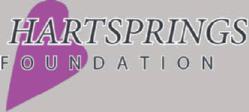
Live fireworks are extremely dangerous and must be disposed of with great caution; call your local Fire Department. Do not throw unused fireworks in the trash or household recycling.
To properly dispose of U.S. flags no longer in usable condition, contact the American Legion, the Veterans of Foreign Wars (VFW), your town hall, or scout troops. Other flags may be recycled in textile recycling programs.
(see “Mercury & Mercury-containing Products”)
(also see “Cooking Oil”)
Food scraps and leftovers are heavy to transport and contribute to climate change when they decompose in landfills; composting food waste locally makes better environmental and economic sense. Local composting options include home composting, curbside pick-up by a private waste hauler, and municipal transfer station compost programs (in Amherst, Bernardston, Charlemont, Conway, Deerfield, Greenfield, Hadley, Leverett, Montague, New Salem, Northampton, Northfield, Orange, Shelburne, Warwick, Wendell & Whately). Find a private hauler near you at: recyclingworksma.com. Many municipalities offer discounted purchase programs for countertop collection pails and home compost bins; see the Community Recycling Information table in this guide for local contact information. For home composting instructions,
visit mass.gov and search for “home compost.”
As of November 2022, Massachusetts businesses, organizations and institutions that create ½ ton of food waste per week will be required to keep it out of the trash and instead reduce it, donate it, or send it out for animal feed, composting, or anaerobic digestion. RecyclingWorks in Massachusetts provides free assistance, food waste estimation tools, hauler lists, and more at: recyclingworksma.com
FRUIT SNACK POUCHES
(see “Plastic Pouches”)
FURNITURE
Furniture in good condition can be sold, donated for reuse, or offered via an online sharing group (e.g. Freecycle.org or a “Buy Nothing” Facebook group). If not reusable, see the Community Recycling Information table in this guide for disposal information (“bulky waste”). As of November 2022, mattresses and box springs may no longer go in the trash. See “Mattresses” for more information.
GOLF BALLS AND CLUBS
Golf balls can’t be recycled, but they may be reused. Contact local golf courses or driving ranges to see if they will accept them or donate them, along with clubs, to First Tee-Massachusetts programs to empower kids and teens through golf (firstteemass.org; click on “donate”). Some thrift stores will accept clubs for resale.
GREETING CARDS
Cards are recyclable with paper if they do not contain metallic inks, glitter, foil, or batteries. Remove electronics from singing greeting cards & recycle button batteries in battery recycling programs (see “Batteries”). St. Jude’s Ranch for Children runs a mail-in greeting card reuse program; note restrictions on certain brands: stjudesranch.org/recycled-card-program.
(see “Coat Hangers”)
The National Hearing Aid
Project accepts used hearing aids for refurbishment and distribution to those that need them: hearingaiddonations.org, 816-895-2410. Also check with your hearing aid specialist for reuse options. If your hearing aid is not worth salvaging, remove the button battery and recycle it in a battery recycling program (see “Batteries”), then place the hearing aid in the trash.
First, consider using up the product according to package directions, or giving it away to someone who will. Products with label warnings & words like caustic, toxic, corrosive, poison, flammable, danger & “keep out of reach of children” all require special handling. New England Disposal Technologies (Westfield, MA) accepts many household hazardous wastes year-round for modest fees (nedt.org; 866769-1621). Empty containers that once contained hazardous wastes are NOT accepted in recycling; replace cap and put empty containers in trash. For safer alternatives to hazardous household products visit: lesstoxicguide.ca, or turi.org/ Our_Work/Community.
Staples and Best Buy stores accept used cartridges for reuse or recycling (and possibly earn store rewards). Other options may be found via a search on earth911.com or find mail-in donation programs online by searching “cartridge donations.” Many manufactures have their own take back programs with free mailing labels. Search online for “(name of manufacturer) cartridge recycling program.”
Unwanted mail & catalogs are recyclable, but it makes more sense to reduce them at the source. Here are four free services to do so:
• Remove your name from commercial mailing lists: directmail.com/mail_preference;
• Stop delivery of unwanted catalogs, enter catalog name at catalogchoice.org;
• End pre-approved credit card & insurance offers: optoutprescreen.com;

• Take your name off phonebook mailing lists: yellowpagesoptout.com
Unwanted keys can be recycled via a scrap metal dumpster at a municipal transfer station (see the Community Recycling Information table in this guide,) or brought to a local scrap metal dealer.

(see “Paint & Paint-related Products”)
Light bulbs of all types should be kept out of recycling bins. Fluorescent bulbs, including “CFLs” should be kept out of trash.
• Fluorescent bulbs, including compact fluorescent bulbs (“CFLs”) and the green tipped “low mercury” type contain mercury vapor and require special disposal. See “mercury & mercury-containing products” in this guide for more information. Handle carefully to avoid breakage.
• LED light bulbs can go in the trash but contain valuable materials and may be recycled with CFLs, if a collection site accepts them (see “mercury & mercury-containing products”).
CONTINUED FROM PAGE S9
• Incandescent light bulbs and halogen light bulbs are not recyclable. Wrap incandescent light bulbs in used paper or plastic before placing them in the trash.
Holiday light strings are NOT accepted in municipal recycling programs because they get wrapped around sorting equipment at recycling facilities, causing hazards for workers. Light strings are often accepted at scrap metal dealers and in scrap metal dumpsters at transfer stations. Broken string lights can be mailed to Christmas Light Source (christmas-light-source.com) or Holiday LEDs (holidayleds. com) for a discount on a future order.
Mail unwanted Mardi Gras beads and trinkets to the Arc of Greater New Orleans’ reuse program: ArcGNO, 925 Labarre Road, Metairie, LA 70001 (arcgno.org; 504-369-4033).
As of November 2022, mattresses and box springs may no longer go in trash or Bulky Waste. Mattress recycling is now mandatory in MA, except for mattresses that are contaminated. Some charities will accept mattresses & box springs in very good condition; call first. When you purchase a new mattress, ask the retailer to take back and recycle the old one. Some transfer stations in western MA accept mattresses for recycling; fees may apply. For local recycling information, search on your town’s website or call your town’s contact number in the Community Recycling Information table in this guide. If your municipality does not have a collection program, call a private junk hauler to pick up your mattress. For more information, visit mass.gov and search for “mattress.”
Disposal of unwanted medi-
cation must be done carefully for several important reasons. Medications should NOT be poured down the drain or flushed down the toilet. Wastewater treatment plants & septic systems are not designed to remove pharmaceuticals from wastewater. Medications should not be thrown in the trash; see below for disposal options.
Help protect the environment and stop prescription drug misuse and abuse. Bring your unwanted, expired, or unused medications to one of the sites below for safe disposal.
Many area police departments offer permanent drop-off boxes for free disposal of prescription and nonprescription drugs, vitamins, and veterinary medications: Agawam, Amherst, Ashfield, Athol, Belchertown, Bernardston, Buckland, Chicopee, Cummington, Deerfield, Easthampton, East Longmeadow, Erving, Goshen, Granby, Greenfield, Hadley, Hampden, Hatfield, Holyoke, Leverett, Longmeadow, Ludlow, Monson, Montague, Northampton, Orange, Palmer, Pelham, South Hadley, Southampton, Southwick, Sunderland, Ware, West Springfield, Westfield, Whately, Wilbraham, and Williamsburg. You do not need to be a resident to use the drop boxes in any of these towns.
Accepted items in police station boxes: prescription and non-prescription drugs, vitamins and veterinary meds. NO liquids, syringes (see ”Needles & Sharps” below), IV equipment or chemotherapy drugs. For more information visit northwesternda.org/addiction-recovery/pages/drugdrop-boxes.
National chain pharmacies host free drop boxes for prescription medications. Call your local store for availability or search a DEA listing of disposal sites at tinyurl.com/ deadisp. For acceptable items, see signage on the drop boxes, call stores or visit pharmacy websites. Some stores that do not have drop boxes offer the DisposeRX program: disposerx.com
National Prescription Drug
Take-Back Days are scheduled for every April and October. DEA’s next National Prescription Drug Take Back Day is April 22, 2023 from 10 am to 2 pm. Find dates and locations for upcoming collections by visiting deadiversion.usdoj. gov/drug_disposal/takeback.
If you are truly unable to deliver medications to a drop box or a take-back day, medications may be safely disposed of in the following manner:
1.) Remove any personal info from labels that could be used to obtain refills; 2.) Render medications unattractive to children, pets & thieves by dissolving pills or tablets in a small amount of water or rubbing alcohol (pour liquid medication into a container of kitty litter or sand); 3.) Place in two sealed plastic bags; and 4.) Conceal the package in your trash. If you have large quantities of medications, consider disposing of them in smaller batches over time or bringing to a collection or drop box. Do not flush prescription drugs down the toilet or drain unless the label or accompanying patient information specifically instructs you to do so. Due to their small size and other factors, empty pill bottles are not recyclable. Be creative with reuse! For example, some animal shelters collect washed, empty pill bottles to send medicines home with adoptees.
Mercury is highly toxic and requires special disposal. It is not hazardous when contained in a sealed device. Reduce exposure by placing items in sealed plastic bags & handling them carefully to avoid breakage. Never put mercury (or items containing mercury) in trash or recycling bins, on the ground, or down a drain. Don’t vacuum even the smallest spill. Instructions for handling mercury exposure can be found at: mass.gov; enter “mercury” in the search bar or search the web for “broken CFL” or “mercury spill.” If a mercury spill does occur, follow the MassDEP’s guide on safely cleaning it up: mass.gov/guides/massdep-mercury-information. Call the Mass DEP Mercury Hotline
if you have questions about mercury or managing it safely: 866-9MERCURY (866-9637287).
For local disposal information for the following mercury items, see the Community Recycling Information table in this guide.
• Fluorescent light bulbs All fluorescent light bulbs (even the low-mercury bulbs with green tips) contain mercury vapor; never put fluorescent light bulbs in trash or recycling. For local disposal information see the Community Recycling Information table in this guide. In addition:
• Businesses can see a list of vendors who can pick up larger quantities at recyclingworksma.com.
• Residents can refer to the MassDEP’s Mercury Disposal Map: tinyurl. com/MassMercuryMap
• For assistance with disposal outlets, dial the MassDEP Mercury Hotline at: (866) 9-MERCURY
Recycling options vary based on the type of bulb:
• Compact fluorescent lamps (CFLs) fit in standard screw-type light sockets & are made of a glass tube. They come in a variety of shapes and styles and can be encased by an outer glass bulb. CFLs are accepted at most municipal transfer stations (handle carefully and hand to attendant) and some Hazardous Waste Collections. For local disposal information see the Community Recycling Information table in this guide. Free recycling for CFL bulbs is offered at Home Depot and Lowe’s Stores. New England Disposal Technologies (Westfield, MA) accepts fluorescent bulbs year-round for various fees (nedt.org; 866-769-1621).
• Larger fluorescent tubes are the types of bulbs that do not fit in standard screw-type sockets. These include long straight tubes, circular or U-shaped tubes, tanning bed lamps, High In-
tensity Discharge (HIDs), & neon light tubing. Accepted at most municipal transfer stations and some Hazardous Waste Collections; see the Community Recycling Information table in this guide for local disposal information. Straight lamps and all others are accepted free of charge at Lowe’s Stores. Handle carefully to avoid breakage; do not tape bulbs together. New England Disposal Technologies (Westfield, MA) accepts fluorescent bulbs year-round for various fees (nedt.org; 866-769-1621).
• Thermometers
Many older household thermometers (fever, candy, meat, deep fry, oven, temperature) contain liquid mercury. A mercury thermometer can be identified by the presence of a silver bulb at the end of a glass tube. Accepted in special programs at many municipal transfer stations and some Hazardous Waste Collections; see the Community Recycling Information table in this guide for local disposal information. Handle carefully and seal in a plastic bag. If the thermometer liquid and bulb is red, blue, purple or green, it is not a mercury thermometer and it can go in the trash.
• Thermostats
Updating to a programmable thermostat? Don’t throw away your old wall-mounted thermostats: they contain a significant amount of liquid mercury. Leave thermostats in one piece, place in a sealed plastic bag, and handle carefully to avoid breakage. In addition to special municipal collection programs (see the Community Recycling Information table in this guide), mercury thermostats are accepted for free recycling by some plumbers and plumbing retail stores. For local dropoff locations, go to thermostat-recycle.org.
• Ballasts
Most fluorescent light fixtures produced before 1979 contained ballasts with PCBs (polychlorinated biphenyls), a highly
toxic substance. PCB-free ballasts are marked “No PCBs.” PCB ballasts are typically collected in special programs at transfer stations or other sites that collect larger fluorescent tube-type bulbs. Electronic and other non-PCB ballasts are safe to go into trash or bulky waste, but are often not accepted in scrap metal recycling bins. See the Community Recycling Information table in this guide for local disposal information.
(see “Scrap Metal”)
MOTH BALLS
(see “Household Hazardous Waste”)
MOTOR OIL & FILTERS
(see “Automotive Products”)
Hungry for Music (hungryformusic.org) accepts used musical instruments. They distribute instruments to underserved children in the US & abroad. Buy reused instruments locally by searching online.
MA Sanitary Code states that it is illegal to dispose of sharps (hypodermic needles, syringes, lancets, & all other medical “sharps”) as trash. Never put a container of sharps in your recycling bin. Collection programs are available in many towns; call your Health Department or see a listing of all the sharps programs in the state, go to mass.gov and type “needle disposal” in the search bar. Sharps containers are available for purchase at pharmacies, and they often include disposal options. Several mailin disposal programs are available; search online for “sharps mail-in programs.” Stericycle is an example of a company that picks up sharps for safe disposal from businesses that generate sharps: stericycle. com or 866-783-7422.
(also see “Plastics”)
Online purchasing has increased the amount of packaging in the residential waste stream. Most of these materi-
als are reusable; some are also recyclable:
• Cardboard boxes can be reused. Cardboard boxes should be recycled in municipal recycling programs; flatten if possible.
• Packing paper is reusable as well as recyclable.
• Amazon’s paper mailer that says “Recycle this mailer just like a box” is recyclable in municipal recycling programs.
• Plastic envelope mailers (single layer or bubble wrap) used by online retailers such as Amazon are recyclable with plastic bags (see “plastics”) in grocery/retail store recycling programs only. Do not put plastic mailers, bags, films, or other “soft plastics” in household recycling.
• Plastic sealed air packaging and bubble wrap are reusable and are accepted for reuse by some pack & ship stores. Deflated air pillows and bubble wrap can be recycled with plastic bags (see “plastics”) in grocery store recycling programs. Do not put in household recycling.
• Paper envelopes with bubble wrap on the inside are not accepted in recycling programs. Reuse or put in the trash.
• Meal delivery kits use thermal box liners (e.g. “Renewliner,” “QLiner,” “Climacell”) to keep food fresh. This packaging might claim recyclability, but it is not accepted in household recycling programs. Reuse, refuse (send back to company), or put in the trash.
• Styrofoam™ blocks & shapes: not accepted in recycling; see “Plastics”
• Foam peanuts: not accepted in recycling; see “Plastics”
• Cornstarch peanuts may be composted in a backyard bin, reused, or placed in the trash. However, these are not accepted by commercial composting facilities or at packing shipping stores.
If your unwanted paint was purchased recently & it’s in good condition, consider donating it for reuse. Many
school or community theatre groups will accept quality paint products. You may also offer useable paint via an online sharing group (e.g. Freecycle.org or a “Buy Nothing” Facebook group).
• Petroleum (oil-based) paints, stains, thinners, & varnishes are considered hazardous materials, requiring proper disposal. See the Community Recycling Information table in this guide.
• New England Disposal Technologies (Westfield, MA) accepts all types of paint year-round for modest fees (nedt.org; 866-769-1621).
• Latex paint & water-based stains can be put in the trash when completely hardened. Speed up the process by adding latex paint hardener (available in hardware stores) or by stirring in clean kitty litter to the consistency of thick oatmeal & allowing the mix to harden. When the contents are no longer liquid, you can put the open paint can (without the lid) in your household trash.
(see wood under “Building & Remodeling Materials”)
Recycled Crafts recycles pantyhose, nylon knee-highs, and tights into pet toys, rugs, placemats, and table runners. They accept clean hosiery in any condition, even those with rips and snags. Email recycledcrafts@live.com for donation information, or visit: savemyhosiery.yolasite.com. Hosiery is also accepted in textile recycling programs, see “Clothing & Textiles.”
Plastic bags should never go into municipal recycling programs. Some retail and grocery stores will accept EMPTY pellet bags in their plastic bag recycling programs (call first). Pellet bags must be dry and completely EMPTY. Turn inside out, shake out, flatten and stack empty bags, roll up the stack and place the roll in an empty pellet bag. Ask your pellet supplier about bulk delivery (avoids bags), recycling programs, or bag take back programs.
Plastic bags that contained pet food, animal feed, or bird seed are not recyclable in municipal recycling or in plastic bag recycling programs at retail stores. Unfortunately, neither are paper feed bags because they are lined with plastic to keep moisture out of the feed. Terracycle offers a few pet food bag recycling programs, some of which have local dropoff sites; go to terracycle.com and type “pet food bags” in the search bar. The Bag Share Project, a local group, may accept certain types of feed bags for reuse, and provides instructions on how to make bags: www.thebagshare.org
Traditional, glossy photographs are not acceptable in recycling because of the photographic chemical coatings in the paper. Old photographs are safe to throw in the trash. More modern photographs may or may not be recyclable depending on the printing process and the type of paper used. Home-printed photographs that are printed on regular paper are acceptable in recycling.
A 2020 study by West Rock (a major US corrugated cardboard manufacturer) found that grease on pizza boxes does NOT cause problems for recycled paper manufacturers, as previously thought. It is now OK to put the ENTIRE pizza box into recycling…but it MUST be empty (no crusts, food, foil, plastic, or waxed paper). Link to the study: tinyurl. com/pizzaboxes2020
Many people assume that all plastic items are accepted in recycling, but recycling is demand-based; only those plastics that can be made cost-effectively into new products are on the “yes” list. Please note that plastic containers from food, beverage, soap and personal care products are the ONLY type of plastic suitable
Some plastic items cause mechanical problems at recycling facilities, cost too much to recycle, are unwanted by manufacturers, or are recyclable only through separate recycling programs. Please do not add these to your household or municipal recycling mix:
• Plastic bags, plastic wraps
• Black plastic (microwavable containers, to-go containers, etc.)
• Forks, spoons, knives & serving utensils
• Plastic items that are smaller than a credit card (e.g. loose caps, straws, condiment cups, Rx bottles)
• Plastic containers larger than 2.5 gallons in size
• Plastic plates and colored/ opaque plastic cups (clear plastic cups are accepted in recycling unless labeled “Compostable”)
• Containers or cups labeled “biodegradable” or “compostable”
• Foam (aka StyrofoamTM) items (cups, egg cartons, food containers/trays, & packing material)
• Tubes (e.g. toothpaste, cosmetics, hair products)
• Plastic containers which once held toxic substances (e.g. motor oil)
• Molded plastic packaging (the stiff type that requires a sharp object to open)
• Binders, folders & plastic-coated (usually shiny) paper
• CDs, DVDs and cases, video & audio tapes
• Plant pots & garden trays
• Six-pack rings (cut them up & then put in trash)
• Hoses, light strings, cords, leashes
• Plexiglass
• PVC products (pipes, siding, etc.)
• Manufactured plastic wood (decking material)
in East Longmeadow, who worked with schools last year to implement sorting stations in cafeterias.
Working with Commonwealth Sustainability, a food scrap and organic waste management service in Ludlow, East Longmeadow’s six schools are sorting their waste, recycling and composting organic waste.
posting. “Administrators and educators realize a potential to decrease trash disposal as well as the benefits to teaching students about composting and waste diversion,” she said.
By C ORI U RBAN SPECIAL TO THEWith the help of staff and custodians and weeks of guidance, the students learned to line up and first pour their liquids out. Next they recycle their milk cartons then throw out their waste (including plastic utensils, straws, sauce packets, plastic baggies, chip bags). Then they recycle water bottles, empty yogurt cups, foil. Finally, they empty their food waste and paper (napkins and brown lunch bags) into a bin.
“Because there is so much waste coming out of schools, it is a great place to teach our youth and create awareness about our environmental impacts on our community and the planet,” said Elizabeth M. Bone, recycling coordinator for the Health Department
“Schools are able to divert multiple tons of food waste from landfills and incinerators each month,” said Steven R. DeMont, co-owner of Commonwealth Sustainability with Matthew G. Gilman. “Disposal costs are much cheaper than garbage because organics can be recycled and then resold. Schools also have the potential to reduce the size of their dumpster or the frequency of dumpster pickups.”
At Mountain View School in East Longmeadow, students did a waste audit before and after they began sorting their waste; they found that 95 percent of their waste could be diverted from the waste stream. Since beginning in August, Commonwealth Sustainability — which works with two school districts and is in the process of setting up a compost program with a third — has collected and composted more than 15,000 pounds of organics.
According to Abbey R. Massaro, waste reduction consultant for The Center for EcoTechnology, the number of schools with composting programs has been increasing over the years, but not all schools in the Pioneer Valley are com-
CET administers the Green Team for the Massachusetts Department of Environmental Protection, a program that helps share recycling and composting resources with educators and schools. Schools and businesses also can receive free technical assistance through the RecyclingWorks MA program, also funded by the MassDEP and administered by CET.
“School composting programs are easy for everyone when students, teachers and

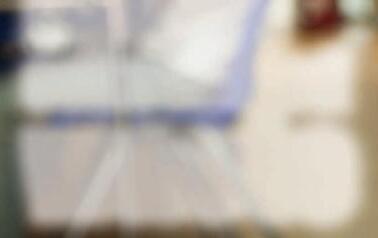

landfills and incinerators, municipalities are looking for cheaper and more environmentally friendly options for waste disposal.
According to the EPA, food waste makes up 21 percent of all municipal waste and an additional 41 percent of municipal waste is organic and also has the potential to
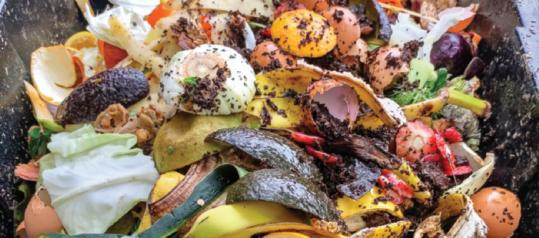
change is right under our feet!”
Many students take pride in volunteering to help their fellow classmates sort materials at lunch. “Collecting food waste for offsite or onsite composting is a fantastic educational opportunity,” Massaro said.
“Schools have the satisfaction of knowing that they’re
custodial staff are thoroughly trained on and engaged with the program,” Massaro said.
“In the absence of clear signage and student or staff volunteers to help sort materials, contamination (improper sorting) can occur in both recycling and composting streams.”
Through the Green Team and RecyclingWorks programs, CET staff can help schools begin composting or improve an existing composting program.
Because of the closing of

be composted. “Composting is cheaper than using landfills or incinerators because food and other organics can be processed into a valuable commodity that can improve soil health and help to combat climate change through the sequestering of excess atmospheric carbon dioxide,” Gilman said. “Applying a ¼-inch depth of compost on one acre of land can capture and store up to 10 tons of atmospheric carbon dioxide. One of the answers to combating climate
providing necessary knowledge and learning opportunities to their students so that we can all have a healthier planet for generations to come,” Gilman noted.
“The earth has been composting for billions of years, and it’s best that humanity helps to aid in that process, not prevent it,” DeMont concluded.
For more information, go to thegreenteam.org or recyclingworksma.com.
When in-person learning resumed after COVID-19 restrictions, the youngest students at Meadow Brook School in East Longmeadow had to learn to sort their lunch waste because they had never before eaten in the cafeteria.
REPUBLICAN
Administrators and educators realize a potential to decrease trash disposal as well as the benefits to teaching students about composting and waste diversion.
under our feet!” take pride help their sort ma“Collecting offsite or onsite fantastic opportunity,” the satisfacthat they’re necessary knowlopporstudents so have a healthgenerations to noted. been combillions of years, humanity process, not DeMont concluded. information, thegreenteam.org or recyclingworksma.com.
CONTINUED FROM PAGE S11
for your household recycling bin. All other forms of plastic must go in the trash or, when available, to a separate special recycling program. See the box “Keep These Plastics out of the Recycling Bin” for additional details.
The following items are welcome in your household recycling bin: plastic containers from food, beverage, soap or personal care products in the form of bottles, jars, jugs, and tubs. Plastic bottle caps & plastic tub lids are recyclable, if attached to the container (not loose). Plastic items that are smaller than a credit card or larger than 2.5 gallons are not acceptable because they cannot be sorted effectively. Bottle pumps should go in the trash. Please note that black plastics are not accepted because they can’t be sorted with optical sorting technology.
Other items on the recycling “yes” list are clear plastic cups, clear plastic clamshells, and clear plastic egg cartons. Cups should ideally be rinsed before recycling; put lids and straws in the trash. If a clear cup is labeled compostable, do not put it in a recycling bin. Visit springfieldmrf.org for details and graphics about household container recycling.
Bags & wrap (Do NOT place in household recycling bin)
Plastic bags, plastic films, and plastic wrap (“soft plastics”) create safety hazards, machinery malfunctions, and environmental problems at recycling facilities. Some of these materials are accepted in retail and grocery store collection programs (e.g. Big Y, Stop & Shop, Target, Walmart, Lowe’s, Staples). In general, clean and dry plastic bags and wraps are recyclable if they are: 1.) clear or translucent; 2.) moderately stretchy; 3.) marked #2 or #4; and 4.) empty and free of food residue. Two important exceptions are household food or “cling” wrap, which must be placed in the trash, and bags
labeled “Compostable,” which can be placed in commercial or municipal composting or trash. See the accompanying table, “Plastic Bag Recycling” or visit plasticfilmrecycling.org for additional details.
Bulky, rigid plastic objects (Do NOT place in household recycling bin)
Many rigid plastic items are reusable until broken or damaged; offer them for free on an online sharing group (e.g. Freecycle.org or a “Buy Nothing” Facebook group).
Some communities offer specialized bulky rigid plastic (BRP) collection programs. Ask your community representative (see the Community Recycling Information table in this guide) about opportunities near you. BRP collections are highly selective and accept only clean, molded, rigid plastic pails, bins, crates, baskets, totes, barrels, wheeled trash toters (metal and wheels removed), and plastic lawn furniture.
Foam
(Do NOT place in household recycling bin)
The recycling market for rigid
foam material (aka Styrofoam™ or expanded polystyrene/EPS) is growing, but only certain blocky foams are accepted for special recycling programs. Rigid foam products may be divided into the general categories of shipping peanuts, blocky packing material, and food-related serve ware (cups, plates, trays):
• Foam shipping peanuts: Foam peanuts are not recyclable, but they are highly reusable. Some local retail shipping outlets accept clean & dry peanuts (call first; search for a store near you at theupsstore.com). Or offer them for local reuse via an online sharing group such as Freecycle.org or a “Buy Nothing” Facebook group.
• Large, rigid foam blocks and sheets: Clean and dry pieces of foam packing materials and coolers are only recyclable through a separate collection. Some communities collect this foam at municipal transfer stations or at special collection events and transport it to a foam recycling facility. Gold Circuit E-Cycling in Agawam (413- 328-3187, goldcircuit.
io; recycleyourfoam.com) accepts various types of foam from the public for a fee.
• Foam cups, plates, and trays: Even if they have a recycling symbol, food-related Styrofoam™ materials are not currently accepted at any recycling facilities. Place in trash.
PLASTIC POUCHES
Flexible plastic pouches that contained applesauce, fruit, kids drinks, yogurt, baby food, and health/beauty products, are NOT recyclable in municipal recycling programs. Terracycle has several different mail-in recycling programs for pouches and caps; go to: terracycle.com and type “pouches” in the search bar. Please remove all residual food and liquid.
(see “Building & Remodeling Materials”)
PROPANE TANKS
Larger varieties of propane: Most propane tanks can be refilled; many businesses that sell propane will accept tanks for reuse under specific con-
ditions. Do not put tanks in household recycling, trash, or scrap metal dumpsters. Tanks are recyclable in special, separate programs at transfer stations or recycling centers. Do not puncture. Close the valves on barbeque grill size tanks. Some recyclers also accept small camping type tanks. Local municipal recycling info is found in the Community Recycling Information table in this guide; find more options at earth911.com.
Offer for reuse. Not accepted in recycling; dispose of in the trash (wrap up broken pieces). Colorful ceramic/porcelain items (even broken ones) are sometimes used by local arts centers or craftspeople, so a phone call or a post to an online sharing group (e.g. Freecycle.org or a local “Buy Nothing” Facebook group) may help extend their usefulness.
Many metal items (like bicycles or BBQ grills) can be
SEE WHAT, PAGE S14
Never place plastic bags of any kind in your home recycling bin! Please clip and hang this sign over your plastic bag recycling collection at home, in the office, at school, or at a business.
• Bags MUST be empty, clean and dry without receipts, coins, or trash.
• Clean, dry plastic bags labeled #2 or #4:
“HDPE,” “PE-HD” OR , “LDPE,” “LLDPE”
Including:
• Grocery & produce bags
• Newspaper bags
• Dry cleaning bags (no receipts/staples)
• Plastic cereal bags (if it tears like paper do not include)
• Sandwich/Ziploc bags and bread bags: no crumbs, oils, food (remove large zippers)
• Retail bags (#2 or #4) with string/hard plastic handles removed
• Plastic outer wrap from packages of toilet paper, paper napkins, paper towels, diapers, sanitary products
• Bubble wrap, air pillows, plastic shipping envelopes (deflate air pillows/cut out labels)
• Case wrap from cases of water, canned pet food, soda, etc.
• Stretch wrap from furniture or electronics
-
• NO bag with a recycling resin code other than #2 (HDPE) or #4 (LDPE)
• NO crinkly grape bags, Lego bags, apple bags (often marked #5)
• NO bags with receipts, coins, trash
• NO bags with food or moisture
• NO food or cling wrap (e.g. Saran)
• NO prepackaged food bags (frozen food or prewashed salad)
• NO pet food, animal feed, bird seed bags
• NO coffee bags
• NO chip bags, granola bar wrappers, candy wrappers
• NO bags with paint or glue
• NO compostable plastic bags
• NO Tyvek™ envelopes
What about pellet stove fuel bags? See “Pellet Bags” in this guide.
For more about plastic bag recycling, and to see pictures of acceptable items, see: plasticfilmrecycling.org
Trex is the major buyer of plastic film; more resources at: nextrex.com
repaired, sold or donated to extend their useful life. Because of the usefulness and value of metal, state regulations prohibit throwing aluminum, steel, iron, lead, stainless steel, copper, brass, or bronze scrap in the trash. Some metal items require special handling due to toxic or pressurized materials and should not be put directly into scrap metal dumpsters: this includes lead acid batteries, propane tanks, helium tanks, fluorescent light ballasts, air conditioners, refrigerators, and automotive parts. Many municipal transfer stations and recycling centers have scrap metal recycling dumpsters; see the Community Recycling Information table in this guide. Some scrap metal dealers will pay for metal items. Search online under “metal recycling” for the scrap yard nearest you and its requirements. Suitable scrap items should be mostly metal by weight; if possible, plastic parts should be removed.
Shoes, along with other textiles, are now a banned waste item in MA trash (as of November 2022). Bring
CLEAN & DRY textiles & shoes to drop-off boxes serviced by organizations such as the Salvation Army (easternusa. salvationarmy.org), Bay State Textiles (baystatetextiles.com/ locations) & donation centers such as Goodwill Industries (goodwill.org). Many municipal transfer stations host textile drop boxes. DO include clean & dry shoes that are well worn or with missing mates.
In addition, several organizations, such as One World Running (oneworldrunning.com), specialize in shoe reuse. Rerun Shoes accepts used running shoes at a Pioneer Valley drop spot, and can coordinate shoe drive fundraisers; visit rerunshoes.com or call (508) 944-2518. DSW Warehouse shoe stores host Soles4souls donation boxes: soles4souls. org
Shredded paper is no longer accepted in household/mu-
nicipal recycling programs. To have confidential documents shredded and recycled, bring them to area businesses (e.g. copy shops, office supply, and shipping stores). Local banks often sponsor free shredding events in the spring and fall. The material that is shredded in these programs is delivered directly to paper mills, which avoids the scattering and contamination that ensues at a household recycling facility. Otherwise, dispose of shredded paper as trash. Paper shreds that are free of plastic and receipts can go in municipal compost programs, where allowed.
Remove all non-alkaline batteries and dispose of them appropriately (see “Batteries”). Most household smoke detectors contain a small amount of a radioactive element, Americium-241. The quantity in each unit is considered harmless, but its presence is worrisome enough that retailer and manufacturer take-back programs exist. Google the manufacturer’s name with “smoke detector recycling” for program and shipping details. Curie Environmental Services offers a fee-based, mail-in smoke alarm recycling program, see curieservices. com. Some communities allow smoke detectors to be thrown away in the bulky waste container at a recycling/transfer station, see the Community Recycling Information table in this guide.
Carbon monoxide detectors are not considered hazardous and can be safely disposed of in the trash after removing (and recycling) all non-alkaline batteries.
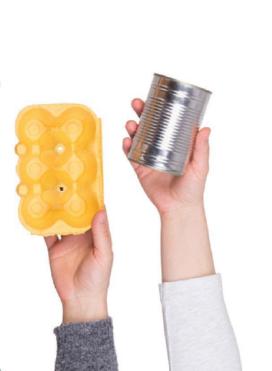
Sporting equipment exchange/donation options are found locally via charitable organizations such as schools, Scout troops, or the Lion’s Club. Consider sharing via online groups (e.g. Freecycle.org or a “Buy Nothing” Facebook group).
STYROFOAM
(see “Plastics: Foam”)
TELEVISIONS
(see “Electronics”)
Check with your local animal shelter or elementary school to see if they accept tennis ball donations (schools use them to reduce the noise and impact of chairs/desks on floors). A mail-in recycling program is available at tennisballrecycling.com.
TEXTILES
(see “Clothing & Textiles”)
THERMOMETERS & THERMOSTATS
(see “Mercury & Mercury-containing Products”)
These items are not accepted in household recycling. Terracycle runs mail-in recycling programs for oral care items (terracycle.com). Preserve® brand toothbrushes can be mailed for recycling (preserve. eco).

Contact your local trophy shop to see if they can reuse your old trophies. A Wisconsin-based trophy organization offers a fee based, mail-in reuse program; go to awardsmall.com and search for
“recycling.” A Massachusetts company accepts metal sports or academic medals/medallions for recycling; see sportsmedalrecycling.com.
Tyvek™ envelopes (large, white envelopes that won’t rip, often from express shipments) are not accepted in municipal/ household recycling, or in the plastic bag recycling programs at grocery and retail stores. Tyvek™ envelopes can be stuffed into a box labeled “Tyvek Recycling” and mailed to: CFS Meridian Recycling, 337 A Industrial Drive, Petersburg, VA 23803. For more information: (804) 732 1907 ext. 7327.
Glass vases are not recyclable. Donate to a local garden club, swap shop, or local florist(s) for reuse (call first).
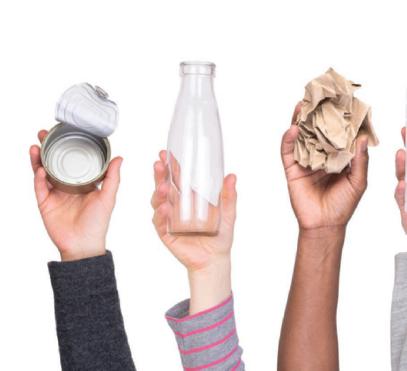
(see “Cooking Oil”)
Old vehicles, even inoperable ones, are valued for spare parts and metal. Consider donating them to a charitable organization (might be tax deductible). Contact your favorite charity or search online for “auto (or vehicle/truck/motorcycle/ boat) donation.” Alternatively, search the Internet under “Auto Wreckers & Salvage.”
WOOD
(see “Building & Remodeling Materials”)
There are no special disposal requirements, but x-rays do contain a small amount of silver. Some hospital radiology
departments will accept them for recycling.
(Leaves, grass, brush, Christmas trees)
Throwing away leaf & yard waste as trash is prohibited by state waste bans. Some communities collect yard waste seasonally for wood chip production or composting; for local contact information, see the Community Recycling Information table in this guide. Goat farmers often accept bare Christmas trees as food. Visit mass.gov/composting-organics to learn about composting yard waste in your backyard.
Yoga mats are not recyclable but can be repurposed. Search online for “yoga mat reuse,” or offer via an online sharing group (e.g. Freecycle.org or a “Buy Nothing” Facebook group).
Looking for something that is not on this list? Here are two local resources with more information:
Springfield MRF’s “What’s Recyclable” page: springfieldmrf.org/whats-recyclable-at-the-mrf
MassDEP’s Recycle Smart Recyclopedia: recyclesmartma.org
Please help us to improve this guide for the next edition! If you encounter errors or have suggestions for changes or additions, contact us at PioneerValleyRRR@gmail.com. Thank you!
Solar power harnesses the sun’s energy and converts it into electricity that can be used in homes. Many people are familiar with photovoltaics (PV), which are the panels that absorb sunlight and create an electric field across their layers. Another solar technology, known as concentrating solar power, is primarily used in large power plants and is not appropriate for residential use, according to Energy.gov.
According to the Office of Energy Efficiency & Renewable Energy, hundreds of thousands of solar panels have been put in use across the United States since 2008 .
Costs associated with solar
The upfront expense of solar panels is significant, costing anywhere from $10,000 to $14,000 for
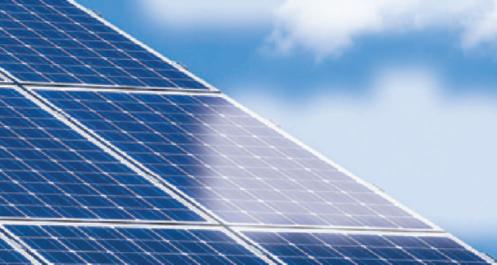

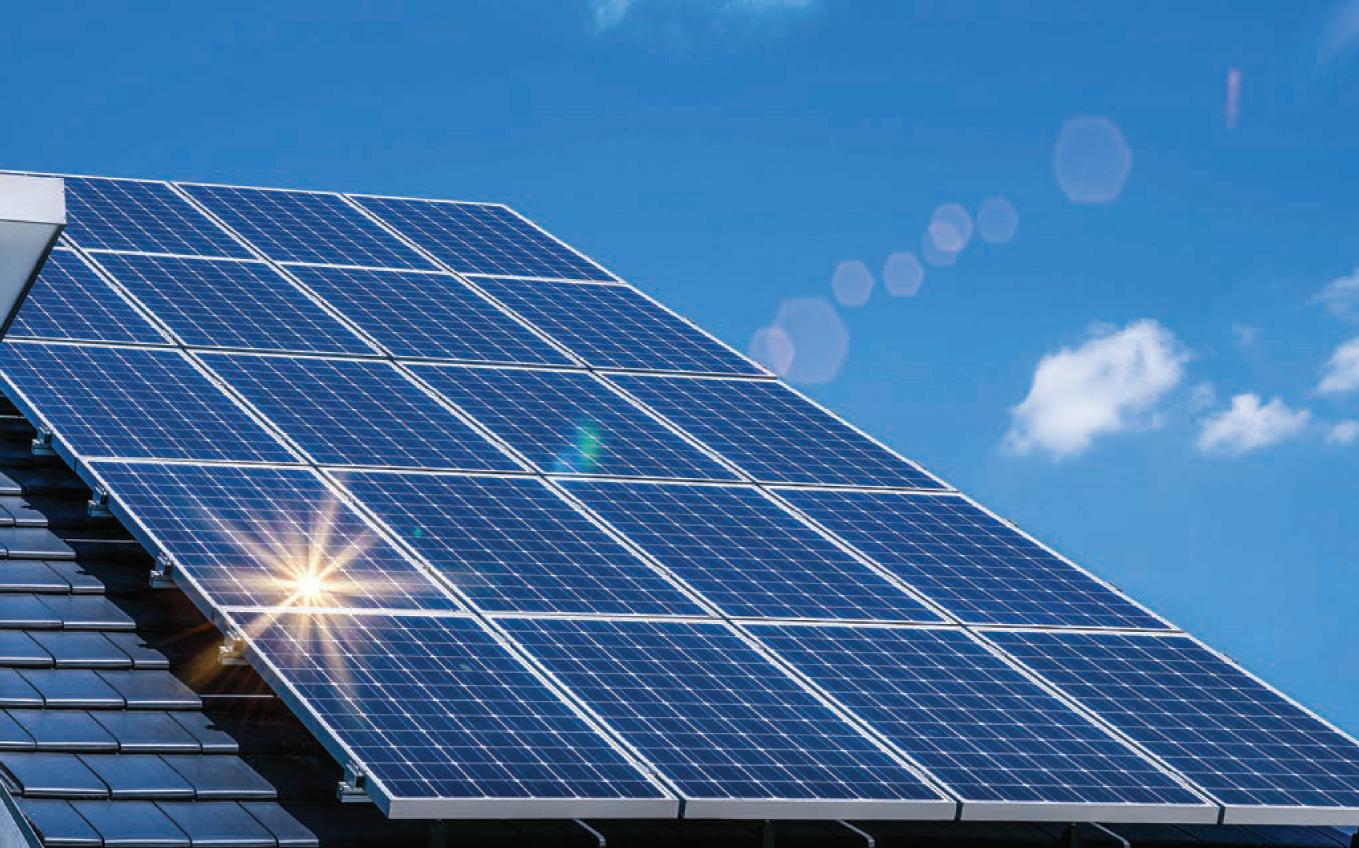
initial installation. However, comparatively speaking, homeowners can spend $1,500 or more per year on electricity, so solar panels will pay for themselves over time. Keep in mind that costs may vary depending on energy needs and how many panels will be required to service the system.
The Federal Trade Commission’s Consumer Advice says that the amount of power generated from a solar energy
system depends on a few factors:
1. The average number of hours of direct, unshaded sunlight your roof gets each year;
2. The pitch (angle), age and condition of your roof, and the compass direction it faces;
3. The size and strength of your system; and
4. Environmental factors such as snow, dust or shade that may cover the system.

Consumers can contact their utility companies to find out if they provide homeowners who produce solar power with “net metering.” This program pays the homeowner money or gives credit for excess power the system produces and returns to the electric grid. Individuals also may be eligible for energy tax credits or other benefits. Homeowners may find it worthwhile to explore solar energy, particularly if they consume a high amount of electricity.
People shopping around for home improvement projects may be leaning toward overhauls that can reduce energy consumption and save them money in the long run. This is a driving factor behind a growing number of homeowners investigating solar energy for their residences.
Consumers can contact their utility companies to find out if they provide homeowners who produce solar power with “net metering.” This program pays the homeowner money or gives credit for excess power the system produces and returns to the electric grid.
 By C ORI U RBAN SPECIAL TO THE REPUBLICAN
By C ORI U RBAN SPECIAL TO THE REPUBLICAN
If you’ve heard that it’s a waste to recycle certain plastics curbside, do not believe what you’ve heard.
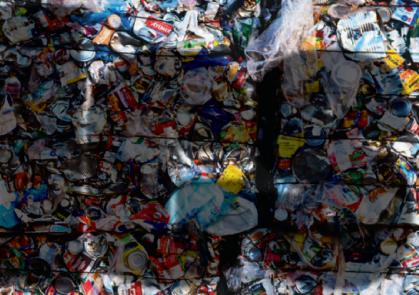

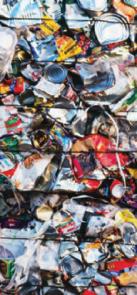
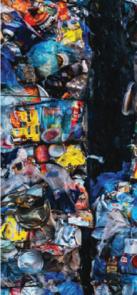

Contrary to what some say — that only 5 or 9 percent of plastic is recycled — those figures are misleading.
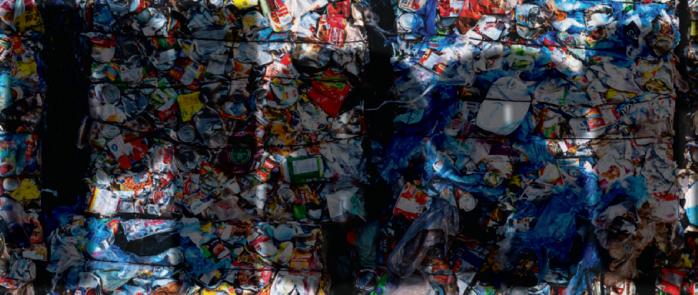
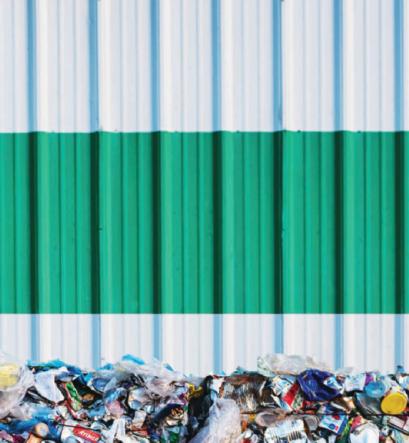
That’s because they include all plastics that are manufactured in a given year, even those not intended to be recycled or accepted in recycling programs — such as appliances, shower curtains, trash bags and medical supplies. They do no refer to the percent of plastics actually recycled after being put out in recycling bins or taken to municipal recycling programs.
“There has been a lot of news suggesting that plastic recycling is broken, and that is terribly misleading,” said Christopher N. Lucarelle, area general manager for WM, a waste and recycling pick-up provider. “While we certainly have a long way to go to create circular solutions for all plastics that are produced, the plastics collected curbside have a home. Not only are all of the bottle, jar, tub and lid
plastics we manage recycled exclusively in North America, but they end up in some really exciting new products.”
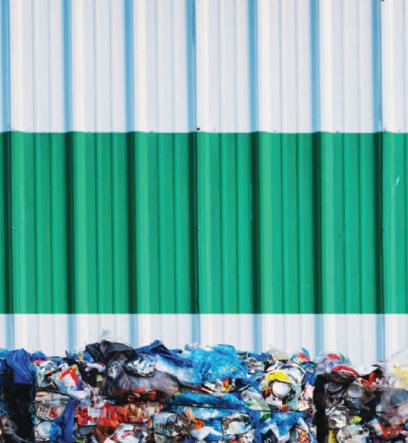
For example, beverage bottles can go from bottle to bottle or into Polyester fiber for carpeting and clothing; detergent and milk jugs go back into bottles and jugs as well as construction pipe; and Polypropylene is used in everything from auto parts to consumer goods.
Reports that only 5 percent (Greenpeace) or 8.5 percent (EPA) of plastics are recycled are misleading because they suggest that all durable plastic items are designed and intended to be recycled. But they aren’t. The only plastics that are recyclable in residential and commercial recycling programs are rigid plastic containers and packaging.
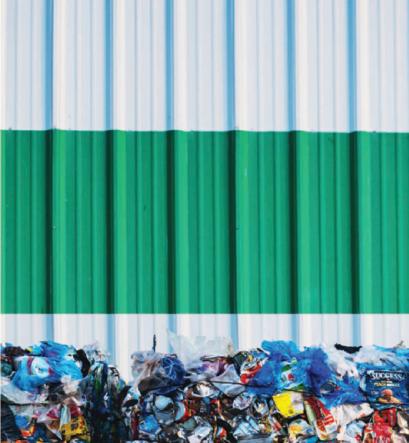
In fiscal year 2022, the Springfield Material Recovery Facility sent 1,752 tons of plastic bottles, jars, jugs and tubs to plastics recyclers where the materials are washed, grinded and pelletized into post-consumer resin that is sold to the packaging, housewares, textiles, automo -
tive and agricultural products industries to make new products.
“The hard number to track is the number of these container types that are thrown in the trash,” Lucarelle said. “We need more people to take
“Material needs to be able to be safely handled by our employees — items like needles and propane tanks can be recycled, just not through a curbside program,” Lucarelle explained. “Technology needs to be available to
The Massachusetts Department of Environmental Protection regulates the activities of Material Recovery Facilities and its enforcement staff conducts regular inspections. MRFs are obligated to report annually to MassDEP the tons of material they recycled, and, upon request, where the material was sent for recycling. “Recyclables are commodities, and sometimes they are more valuable than the cost to process and sort them and sometimes they are not. The oversight is the state’s way of ensuring that recyclables end up in a secondary market and repurposed,” Lucarelle said.
the little bit of time it takes to put materials in the correct bins; we need to continue to educate and improve public space recycling.”
Material Recovery Facility operators use three criteria to determine whether a material is acceptable: safety, MRF technology and market.
sort the materials. An empty coffee pod is a material that can be recycled but if it is too small to be recovered in a MRF then it ends up as waste or as a contaminate in the wrong stream.” Finally, there needs to be a viable market for the material.
According to the state’s solid waste characterization data there are more than 100,000 tons of container plastics thrown out each year. “Quite simply, we need consumers to take the time to place these items in recycling bins rather than the trash. It also wouldn’t hurt if people purchased items that were manufactured from post-consumer plastics,” he added. So if you think curbside recycling is a waste of time, think again.
Recyclables are commodities, and sometimes they are more valuable than the cost to process and sort them and sometimes they are not. The oversight is the state’s way of ensuring that recyclables end up in a secondary market and repurposed.
Disposal of unwanted medication must be done carefully. Medications should NOT be poured down the drain or flushed down the toilet.
The following Police Departments have permanent safe Drug Disposal Kiosks in their lobbies. They will not accept illegal drugs, needles, lotions or liquids, aerosol cans, thermometers or hydrogen peroxide.
Agawam, Amherst, Ashfield, Athol, Belchertown, Bernardston, Buckland, Chicopee, Cummington, Deerfield, Easthampton, East Longmeadow, Erving,
Goshen, Granby, Greenfield, Hadley, Hampden, Hatfield, Holyoke, Leverett, Longmeadow, Ludlow, Monson, Montague, Northampton, Orange, Palmer, Pelham, South Hadley, Southampton, Southwick, Sunderland, Ware, West Springfield, Westfield, Whately, Wilbraham, and Williamsburg.
Springfield has two locations;
Walgreens
501 Sumner Ave
Safe Medication Disposal
Kiosk
Baystate Medical Center
59 Chestnut Street
It is inside the front entrance to the right and is secure and accessible 24 hours a day 7 days a week.
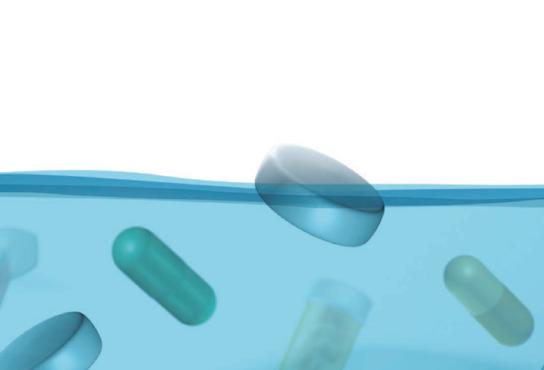
In homes that use septic tanks, prescription and overthe-counter drugs flushed down the toilet can leach into the ground and seep into ground water. In cities and towns where residences are connected to wastewater treatment plants, prescription and over-the-

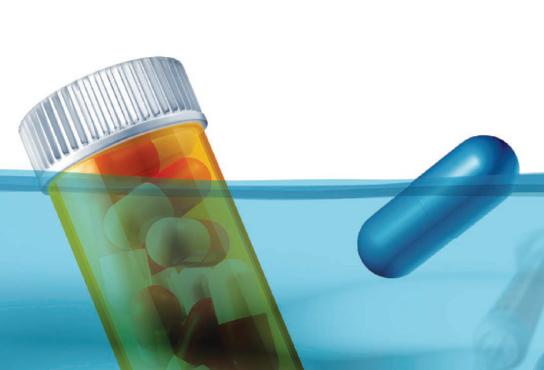
counter drugs poured down the sink or flushed down the toilet can pass through the treatment system and enter rivers and lakes. They may flow downstream to serve as sources for community drinking water supplies. Water treatment plants are generally not equipped to routinely remove medicines.
For more information, go to www.epa.gov/ppcp/ Or call the Safe Drinking Water Hotline at 800-426-4791
DEA Registration Call Center 1-800-882-9539 to find a collection receptacle location near you.
The DEA National Drug
Take Back Event is scheduled on April 22, 2023. Please check with your local authorities or Health Departments to see if your City or Town will be participating.
Springfield’s 2023 Drug Take back event will be held on April 22nd from 10am-2pm at Central High School parking lot.
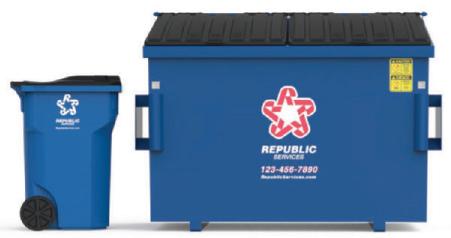



Please call 413.557.6700 or visit RepublicServices.com for more information. Get started today.

Protect your home and western Massachusetts by properly disposing of old household chemicals and mercury containing items. Residential HHW collection programs will accept a wide range of unwanted household products with Labels that indicate that special handling is required. Never put these products in trash or recycling bins. Contact your town or city DPW or Health Department for disposal options. Empty hazardous waste containers should be put in the trash, not recycling.
Look for products labeled: CAUSTIC, TOXIC, CORROSIVE, POISON, FLAMMABLE, WARNING, DANGER, CAUTION
Pesticides
Insect sprays
Fungicides
Flea powder
Herbicides
Root killers
Rodent killers
Muriatic acid
No-Pest strips
Pool chemicals
Lighter fluid
Used motor oil
Engine degreaser
Gas treatments
Gasoline
Kerosene
Solvents
Automobile batteries
Brake fluid
Carburetor cleaner
Creosote sealer
Asphalt sealer
Refrigerants
Antifreeze
Transmission fluid Radiator flush
Aerosol cans
Roofing tar
Solvents
Varnish Sealants
Wood strippers
Rust inhibitors
Paint thinners
Degreasers
Wood preservatives
Wood strippers
Stains
Lead & oil–based paints (No latex paint)
Photo chemicals
Oven cleaners
Furniture polish
Upholstery cleaner
Metal polish
Mothballs
Spot remover
Drain cleaners
Toilet cleaners
Fluorescent light bulbs
Mercury thermometers
Mercury thermostats
Chemistry kits
Arts & crafts supplies
Button batteries
Rechargeable batteries
Medications, Fluorescent bulbs, Latex paint, empty containers from hazardous products, asbestos, gas cylinders, radioactive material, explosives (including ammunition & fireworks)
* LATEX PAINT is not hazardous. Completely dry, uncovered cans of latex paint may be placed with regular trash. Below is a listing of scheduled residential HHW collection programs in Hampden County for 2023. Pre-registration is always required. Residents of the towns and cities listed below may participate in their own community’s event, usually at no cost. In some cases, arrangements can be made for non-resident and small businesses to participate for a fee. If your community is not listed, call your community representative.
2023 Dates Municipality Contact Phone
April 1, April 15, May 13
Oct. 7, Oct. 28, Nov. 18
September 9th
Mondays & Wednesdays 9am-4pm Saturdays 9am-1pm
May 6th, October 7th
October 7th
Mondays & Wednesdays 9am-4pm Saturdays 9am-1pm
Allthe or drop-off
Below is an then baled correctly sorted. Materials are to be sorted PLEASE DO
Plastic Bags
These cannot through your program because around the conveyor the recycling causes the line down in order all the bags. Bags recycled through grocery stores.
Bagged Materials
Springfield
Cristina Ferrera 413-736-3111
Agawam Tracy DeMaio 413-821-0624
East Longmeadow, Longmeadow
* Check town website for details
NEDT Westfield (Fees may apply) East Longmeadow residents contact Liz Bone
866-769-1621
413-525-5400 x1108
Chicopee Barry Brouillard 413-594-3557
West Springfield
New England Disposal Technologies (open to all, small fees may apply)
Chantal Laliberte 413-263-3234
NEDT Westfield 866-769-1621
Please note: this schedule is subject to change due to municipal budget constraints and uncertainties.
These cannot both because plastic bags (see also because to be opened materials. There the time nor the accommodate materials will AWAY.
Items that Wrap and Tangle Includes items
All the items listed here are NOT able to be recycled through your curbside or drop-off
Below is an explanation of WHY they are not acceptable. Please bear in mind that all materials collected for recycling are sorted and then baled and sent to a vendor to be turned into new materials. It is very important for these vendors that the materials be clean and correctly sorted. If there is NO MARKET for a material, EVEN IF IT APPEARS to be recyclable, then that material cannot be collected. Materials are sorted both by machinery and also by hand. Adding materials which cannot be recycled means those materials will have to be sorted out from the proper recyclables and then THROWN AWAY. This adds both time and expense to the recycling process, so PLEASE DO NOT include any of the following items:
Plastic Bags

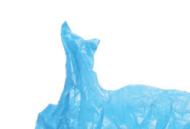
These cannot be recycled through your recycling program because they wrap around the conveyor belt at the recycling facility, which causes the line to be shut down in order to strip away all the bags. Bags CAN be recycled through your local grocery stores.
Bagged Materials
These cannot be recycled both because they include plastic bags (see above) but also because they would need to be opened by hand to sort materials. There is neither the time nor the personnel to accommodate this. Bagged materials will be THROWN AWAY.
Items that Wrap and Tangle
Includes items such as hoses,








light strings, anything which could wrap around a conveyor belt (think of materials which clog up a lawnmower, for instance). These materials are both non-recyclable and cause the line to be shut down at the recycling facility.
Syringes
These are a bio hazard and pose a danger to workers. Needles of any kind should be disposed of properly through a municipal or other safe SHARPS disposal program. Contact your local municipality for options.
Food Waste
Food Waste should never be left inside of recyclables, nor placed in a recycling collection bin. Think of the icky mess and the sorters having to handle the waste! Food waste CAN BE COMPOSTED.
Check with your municipality for options including compost bin purchase programs.
Hazardous Waste Containers



Hazardous chemicals leach into plastics, rendering the plastic unfit for other uses. Please deposit empty containers which have held hazardous chemicals into the trash.


Styrofoam

Expanded polystyrene (EPS, trademarked ‘Styrofoam’) is not accepted at local recycling facilities, as its light weight makes it too costly to ship. However, EPS can be shredded and compressed into blocks to be transformed into pellets for recycling into picture frames and car bumpers. Please check the Springfield MRF website for Styrofoam recycling options.
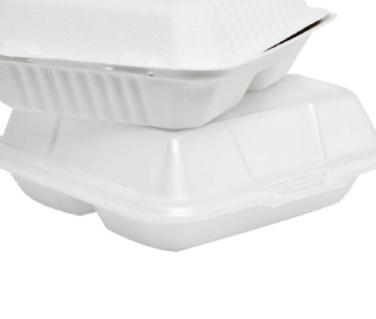
Such as Solo cups are categorized as a # 6 plastic. This is the same category as Styrofoam, polystyrene, and expanded polystyrene. There is no market for these items, please deposit in trash. Clear plastic cups are acceptable.
Light bulbs
Incandescent light bulbs have a different type of glass from regular bottles and jars, which makes them unrecyclable, plus they invariably break making them a hazard for workers. These should be deposited in the trash. Fluorescent light bulbs contain mercury and should be properly recycled. Several large home improvement stores accept fluorescent bulbs free of charge. Please also check with your municipality to see
FOR MORE INFORMATION ON RECYCLING THESE ITEMS PLEASE CHECK THE SPRINGFIELD MATERIALS RECYCLING FACILITY WEBSITE AT WWW.SPRINGFIELDMRF.ORG.
if they collect fluorescent light bulbs.
These items get caught in the conveyor belts at the recycling facility. Please check your municipality for scrap metal and swap shop options.
Ceramics and other materials which make up dishware is not recyclable. Please check with your municipality for swap shop options; otherwise please place in the trash.
Electronics Electronics contain some hazardous chemicals and sometimes leaded glass. Electronics should be properly recycled; please check with your municipality for electronics recycling options.
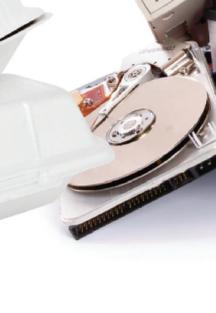
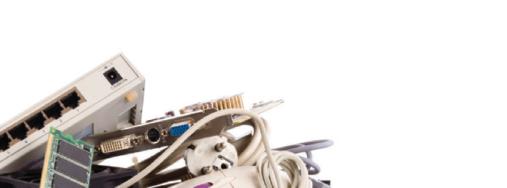
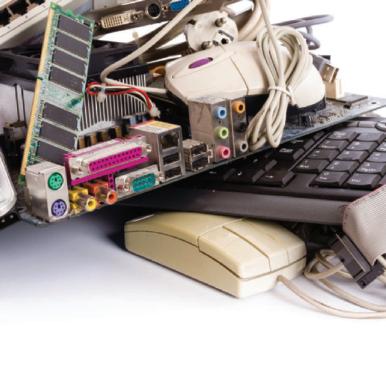
For a complete YES & NO list of what can be recycled, visit www.springfieldmrf.org or call the recycling hotline for more detailed information: 888-888-0784 ext. 52293 or 413-784-1100, ext. 52293.

Food waste is a major contribution to climate change and preventing this waste should be a high priority for all households and businesses. There are ways to prevent food waste at home and ensuring the food you buy or grow goes as far as possible. Some tips are below:
• Cook with food you already have, utilize a “first in first out” mentality
• Freeze leftovers to be used later
• Utilzie veggie peels and trimmings for stocks and broths

• Keep a list of what you have and take an inventory before going to the store!
• Plan out meals for the week
• Compost food scraps at home or with a local food scraps hauler!

More tips can be found at the EPA’s Website: https:// www.epa.gov/recycle/preventing-wasted-food-home.

Composting at home is easy and can help reduce your impact on the environment, save your local community money on disposal costs, and helps create a nutrient rich soil for gardening! It is estimated that about 30% of what we throw away in Massachusetts could alternatively be composted. An ideal place for your compost bin is in a shady location, near a garden hose as dry material added to your compost will need to be kept somewhat moist. “Brown” carbon-rich materials such as leaves, straw, used paper towels, napkins, ripped up egg cartons, paper bags, or newspaper, and “green” nitrogen-rich materials such as food waste and grass clippings can be added to your
bin. Make sure large chunks of fruit or vegetable scraps are cut into smaller pieces to break down faster.


In your kitchen, use a small pail or bowl with a lid to collect fruit and vegetable trimmings, eggshells, coffee grounds and filters, stale bread and leftover grains. (In the summer, some people store their compostables in the freezer to avoid fruit flies.) Add these “green” materials to your bin by making a hole in the center of the pile, dumping the kitchen scraps in the hole and covering the scraps with soil, leaves, or other carbon-rich materials. Burying the fresh kitchen scraps eliminates flies and odor and speeds up the compost process. Do not compost pet wastes, meat, bones,
poultry, fish, dairy, and oily foods such as peanut butter or salad dressing.
The composting process needs oxygen; stir the pile occasionally with a shovel or pitchfork. Add water as needed to keep the contents as damp as a wrung out sponge.
Over 50 western Massachusetts municipalities sell wildlife-resistant compost bins at cost or below, ranging from $25-$50. To find out where to purchase a bin from your city or town, contact your community representative listed on the community
info page in this guide, or call your town hall. Compost bins are also available at local garden centers and online.
Finished compost can be added to gardens and lawns to enrich the soil. Compost reduces the need to water, and reduces the purchase of bagged fertilizers and topsoil, again saving money and resources. For more information, see the MassDEP’s compost page: https://www. mass.gov/composting-organics.
In your kitchen, use a small pail or bowl with a lid to collect fruit and vegetable trimmings, eggshells, coffee grounds and filters, stale bread and leftover grains.
guide, or hall. Comavailable centers and compost can be and lawns


Compost to water, purchase of fertilizers and topmoney and more inforMassDEP’s https://www. mass.gov/composting-or-

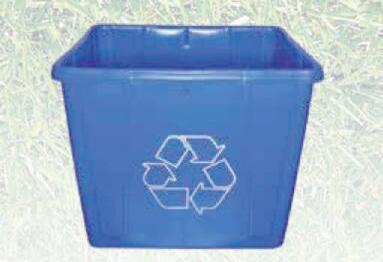
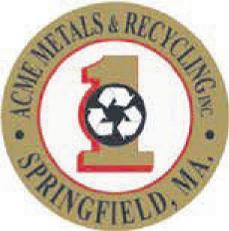
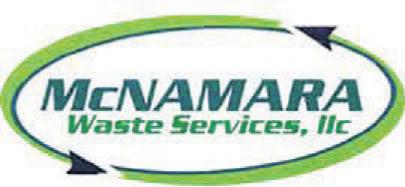




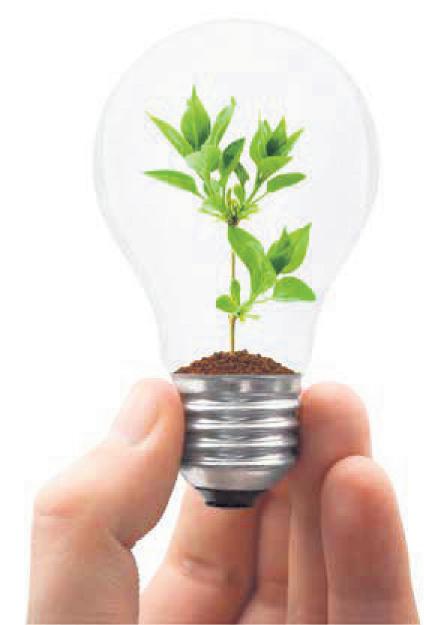



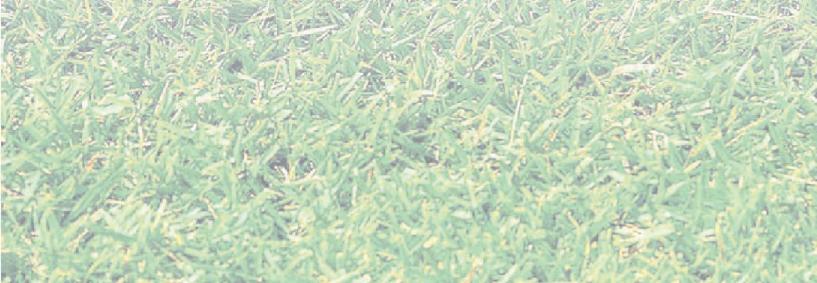
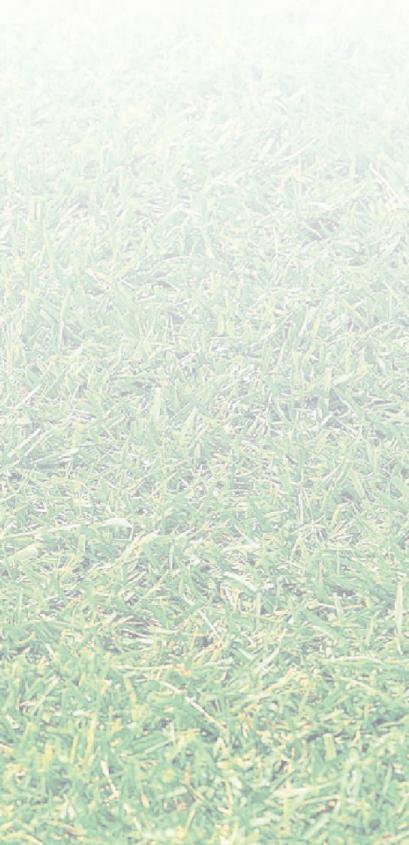
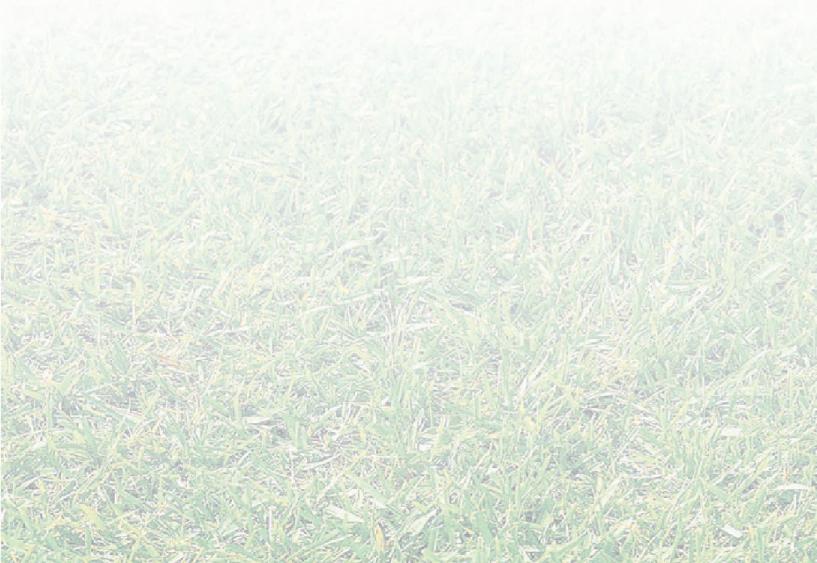
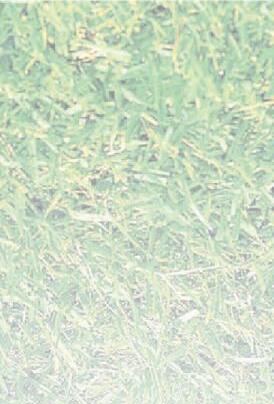

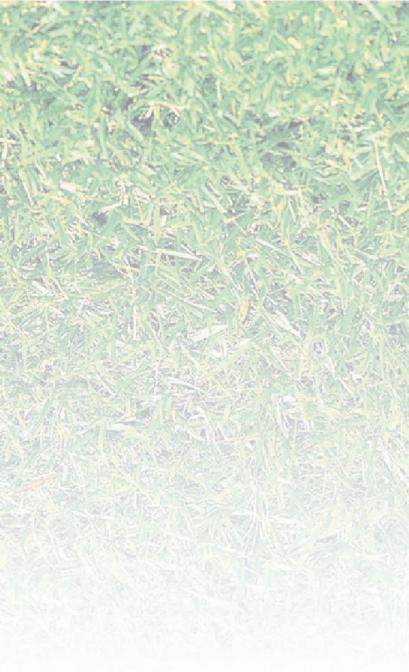

When


at the curb — like cardboard, newspaper and plastics. But the issue of batteries being improperly disposed of is a concern to Cappadona.
Lithium-ion batteries are “very, very dangerous” if put into recycling bins or rubbish barrels, he said.
By C ORI U RBAN SPECIAL TO THE REPUBLICANThe vice president of Casella Resource Solutions — which is based in Rutland, Vermont, and serves the Northeast — understands just how important are proper recycling/ disposal and the education of consumers about the dangers of putting batteries into waste or recycling containers.
Casella uses a variety of communications tools including social media, email and ads and provides customers with a list of what can and cannot be recycled.
Most commercial lithium-ion batteries are used in consumer electronics, power tools, garden equipment and electric vehicles.
Casella does not recycle any batteries; its business is processing traditional recyclables — what consumers put
The company produces quality recycling, meaning categories of recycled materials cannot be contaminated by food waste, plastic bags, film or other contaminants.
Contamination with lithium-ion batteries would cause a safety issue. “They are the single most dangerous items” that could be put into waste or recycling bins, Cappadona said.
If they get to a transfer station to be brought to a landfill or to be incinerated and end up in a pile with other materials, they could burn up or be run over by a piece of equipment like a fork lift and explode and cause fires. For example, in 2016, a fire broke out at the Shoreway Environmental Center in San Carlos, California, resulting $6.8 million in damage. The cause of the fire was an improperly recycled lithium-ion battery. That same year, a Texas recycling plant burst into flames; the cause was believed to be the same.
According to casella.com, nearly 300 such fires and three fatalities were reported at North American facilities in 2017.
What is the proper procedure to get rid of batteries?


“The first option is to have the retailer who sold you the batteries take them in for recycling,” said Jeremy G. Paradis, director of environmental health and safety for USA Waste & Recycling in Enfield, Connecticut. For example, bring your car battery back to the auto parts store when you purchase a new car battery. Bring your cordless tool battery back to the hardware store where you bought the tool or where you buy new tools.
The second option is
to bring it to a municipal collection program, if one is available.
A third option is to bring these batteries to a scheduled household hazardous waste collection authorized by the Massachusetts Department of Environmental Protection where the batteries
must not be disposed of in trash or recycling streams. This results in fires, injuries, property damage and many other emergencies that harm the community, first responders and potentially our team members. Managing batteries through approved haulers and recyclers will control and
will be packaged properly and shipped to an approved recycler.
“It would be best if all battery types were recycled through one of the options … and we hope to see this practice supported by regulatory agencies and the consumer, industrial and commercial markets,” Paradis said, noting that more of them are seen in trash and recycling loads and in transfer stations. “Batteries
prevent these emergencies.” Although there will never be 100 percent compliance for recycling, Cappadona said once people are educated about the dangers of not disposing of batteries properly and understand it is a matter of safety, “people do comply. It’s just educating them.”
For more information, go to call2recycle.org or recyclesmartma.org.
When talking about the importance of recycling batteries, Robert J. Cappadona does, one could say, get charged up.
If they get to a transfer station to be brought to a landfill or to be incinerated and end up in a pile with other materials, they could burn up or be run over by a piece of equipment like a fork lift and explode and cause fires.
This table provides information about municipally funded solid waste collection programs. If an item is not checked for a particular town, call the contact number listed for more information; there may be an alternate disposal option or annual collection for this material. For more information regarding your communitites program, call the contact number for your commuity or visit www.springfieldmrf.org
